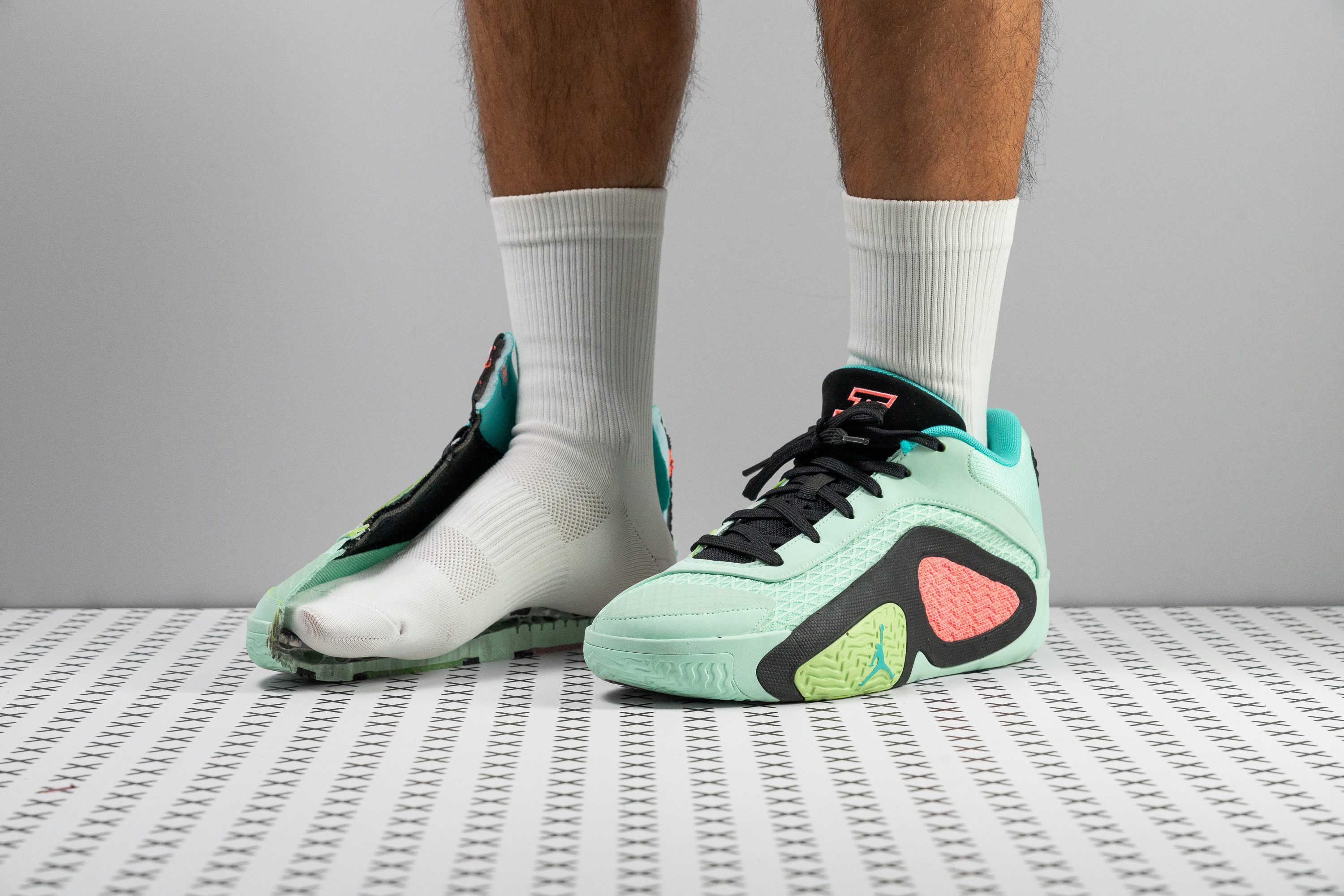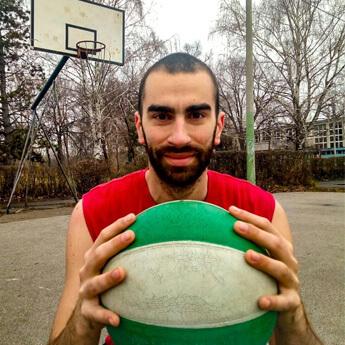Our verdict
Pros
- Very durable overall
- Nice lockdown feel
- A lot of court feel
- Improved outsole coverage
- Great lateral support
- Full-length Air Strobel
- Unique-retro design
- Affordable
Cons
- Feels pretty dull
- Dust magnet
- Very thin midsole
Audience verdict
Comparison
The most similar basketball shoes compared
+ + Add a shoe | |||||
|---|---|---|---|---|---|
| Audience score | 88 Great! | 87 Great! | 89 Great! | 83 Good! | |
| Price | £130 | £120 | £190 | £100 | |
| Signature | Jayson Tatum | Jayson Tatum | - | Michael Jordan | |
| Shock absorption | - | Low | Moderate | - | |
| Energy return | - | Low | High | - | |
| Traction | - | Low | Moderate | - | |
| Top | - | Low | Low | Low | |
| Ankle support | ✓ | ✓ | ✓ | ✓ | |
| Weight lab | 12.9 oz / 366g | 12.4 oz / 352g | 11.8 oz / 335g | 14.4 oz / 407g | |
| Lightweight | ✓ | ✓ | ✓ | ✗ | |
| Breathability | Moderate | Warm | Warm | Moderate | |
| Outsole durability | Good | Good | Good | Bad | |
| Drop lab | 4.4 mm | 7.8 mm | 5.5 mm | 4.7 mm | |
| Heel stack lab | 26.6 mm | 24.8 mm | 27.0 mm | 23.2 mm | |
| Forefoot | 22.2 mm | 17.0 mm | 21.5 mm | 18.5 mm | |
| Size | True to size | True to size | True to size | Half size small | |
| Midsole softness | Firm | Soft | Soft | Balanced | |
| Stiffness | Stiff | Moderate | Stiff | Stiff | |
| Torsional rigidity | Stiff | Moderate | Stiff | Stiff | |
| Heel counter stiffness | Flexible | Flexible | Flexible | Flexible | |
| Width / fit | Medium | Narrow | Medium | Medium | |
| Toebox width | Narrow | Medium | Medium | Medium | |
| Midsole width - forefoot | Average | Narrow | Average | Very wide | |
| Midsole width - heel | Narrow | Narrow | Narrow | Average | |
| Heel padding durability | Decent | Decent | Bad | Bad | |
| Toebox durability | Decent | Decent | Decent | Decent | |
| Insole thickness | Average | Average | Average | Average | |
| Outsole hardness | Average | - | Hard | Average | |
| Outsole thickness | Average | Average | Average | Average | |
| Heel tab | None | None | None | Finger loop | |
| Ranking | #35 Top 40% | #27 Top 50% | #13 Top 25% | #46 Bottom 14% | |
| Popularity | #64 Bottom 27% | #20 Top 38% | #3 Top 6% | #39 Bottom 27% |
Who should buy
If you liked the Tatum 1, you should definitely check the Tatum 2 out. And don't worry if you're new to Jay Tatum's signature hoopers, we believe you're gonna like them if you're looking for:
- A very durable pair to hoop, hoop, and keep hooping.
- Lots of court feel to perform aggressive moves.
- A solid lockdown feel to give you some extra confidence.
- A unique-retro style to flash when you're playing.
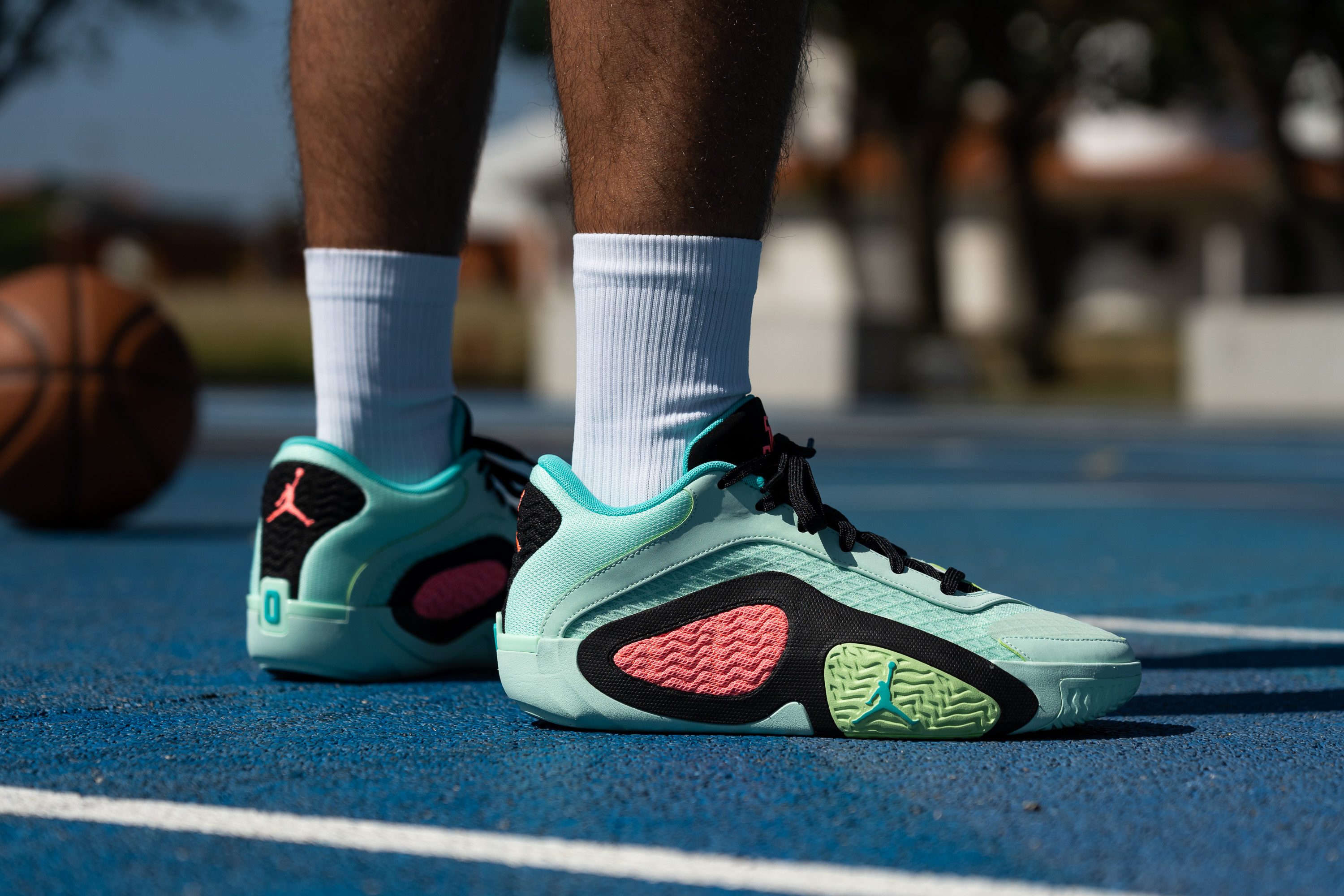
Who should not buy
During our wear tests, we've verified that this shoe underperforms in dusty courts. But that's not all, this model doesn't only pick up dust, it also holds on to it! Once the rubber of the outsole had warmed up, the traction of these Jordans improved; yet, if that's not enough for you or you tend to play in very dusty courts, then we believe you should have a look at the Giannis Immortality 2.
If you're looking for a fun shoe to play with, this isn't it. Its cushioning can feel rather dull, so don't expect much bounce. In that sense, we think you should have a look at the Adidas Dame Certified. It's an affordable pair with a nice mix of court feel and impact protection.
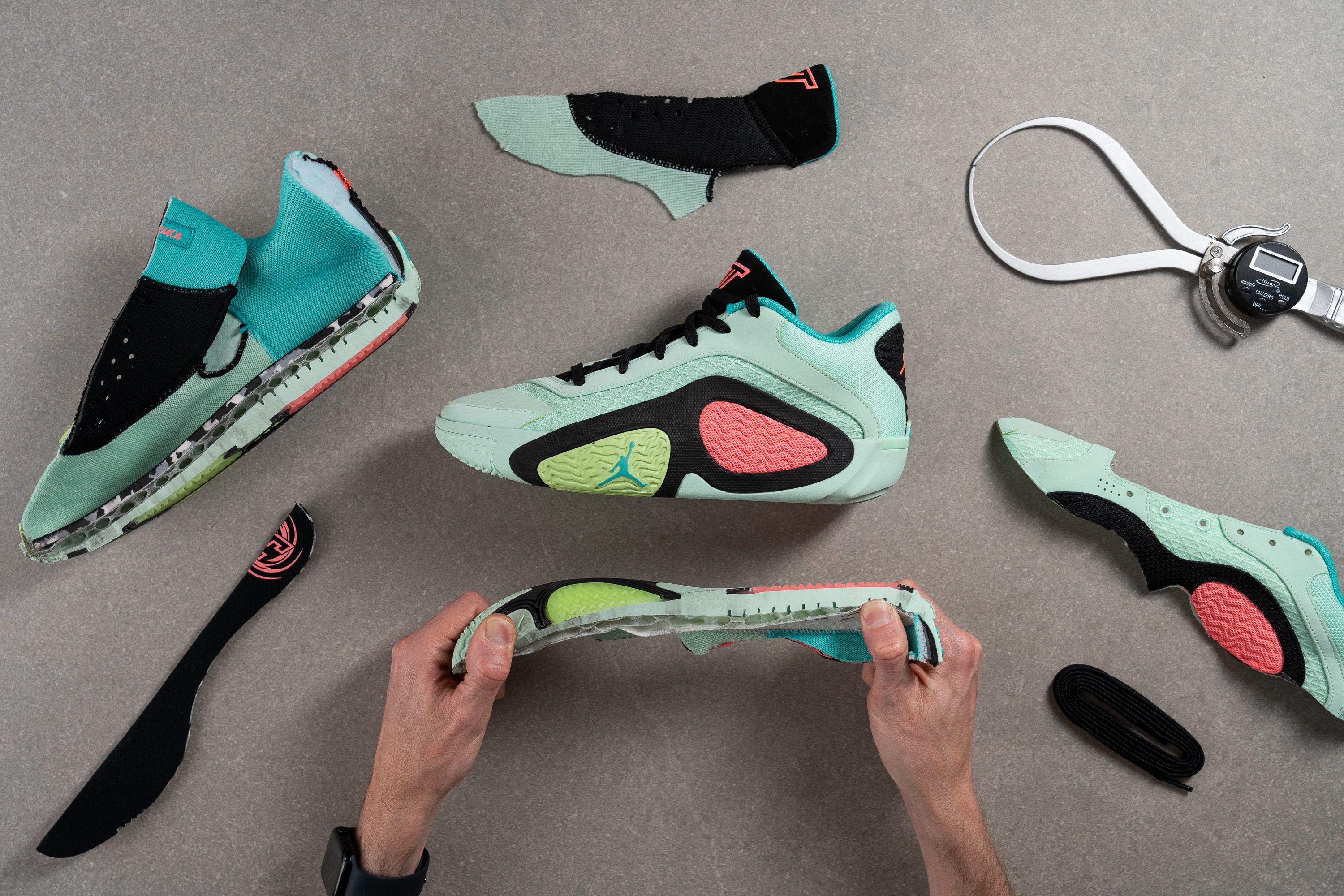
Cushioning
Heel stack
At 26.6 mm according to our calliper, these Jordans stay pretty close to the ground.
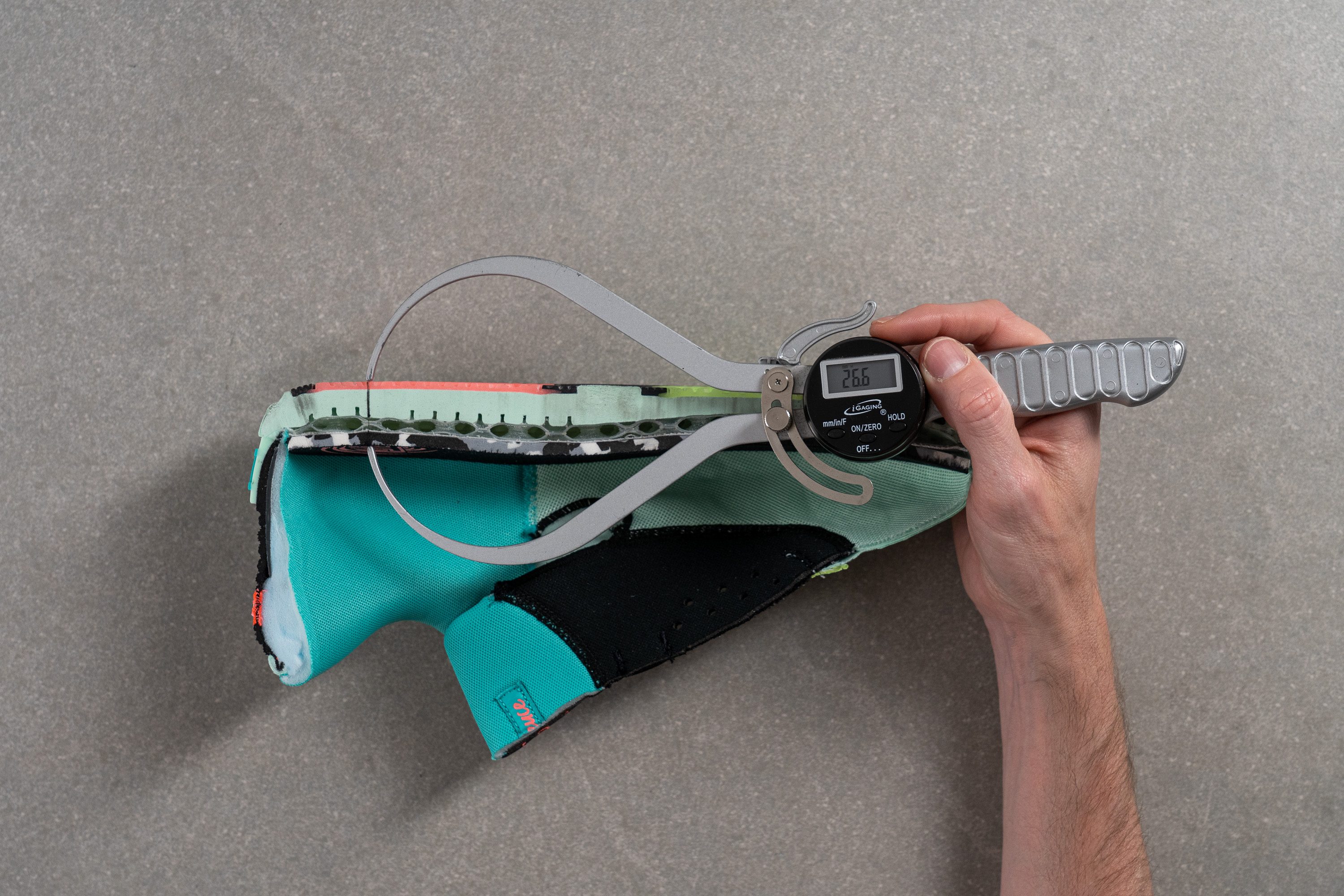
Even though this score is lower than average and than the one the v1 got, we didn't think it was a problem. Apart from reducing some extra weight, this new model has a full-length Air Strobel, which is terrific for comfort and cushioning. Even though its midsole is made of EVA, which is on the harder side, this extra Air bed made sure our landings were not that harsh.
| Tatum 2 | 26.6 mm |
| Average | 28.8 mm |
Forefoot stack
Following our durometer reading, the forefoot stack is average at 22.2 mm.
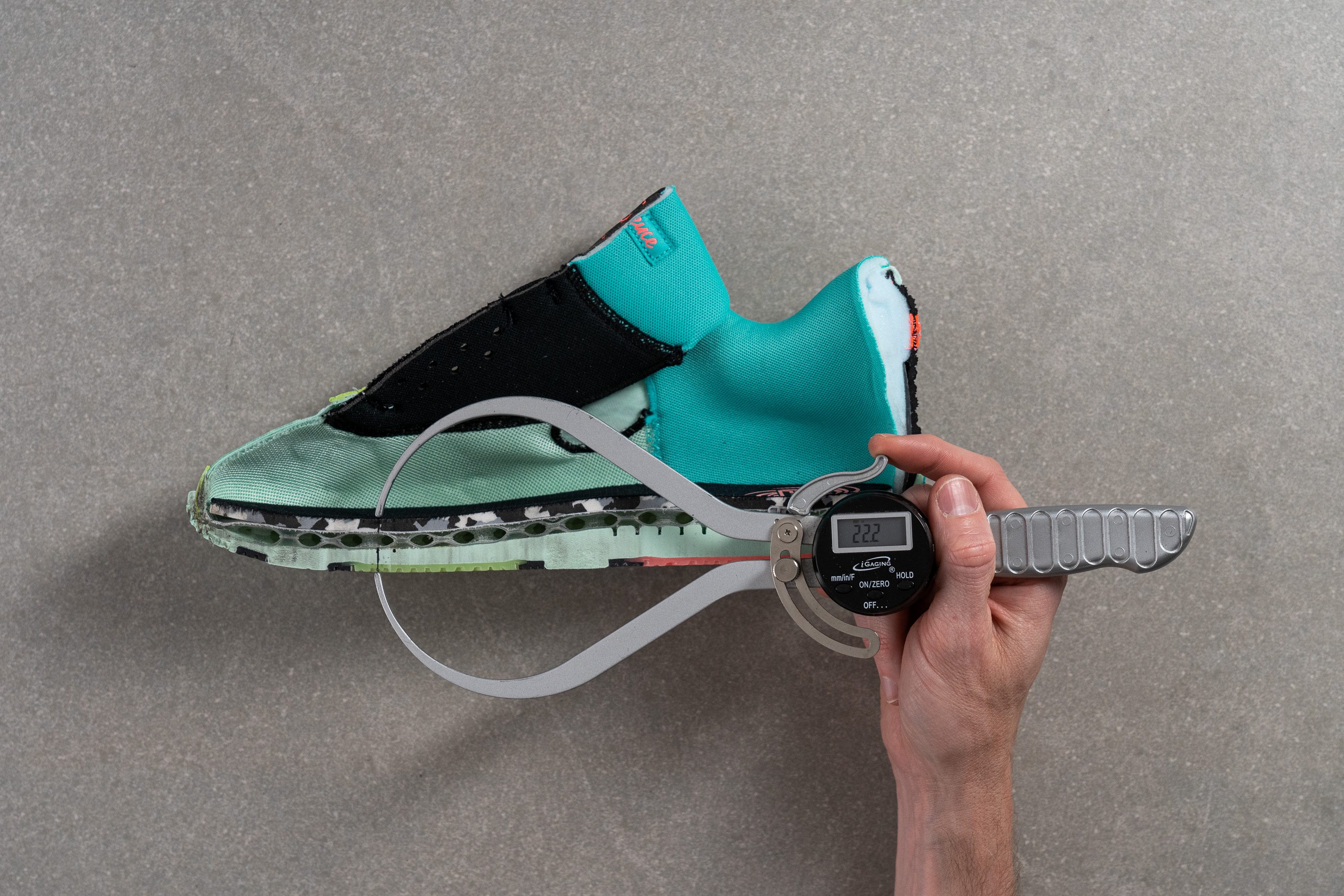
We loved how this model offered a nice mix of ground feel and cushioning. We were able to perform dribbles that required an extra ounce of control, and at the same time our feet felt supported by the Air Strobel.
The extra cushioning makes the shoe fit for aggressive jumps if you're going for a rebound. As you might know, sometimes you hit other players mid-air when you're trying to catch the ball. When a shoe's cushioning is not enough, the impact might be harsher on the user's joints, which is something we want to avoid.
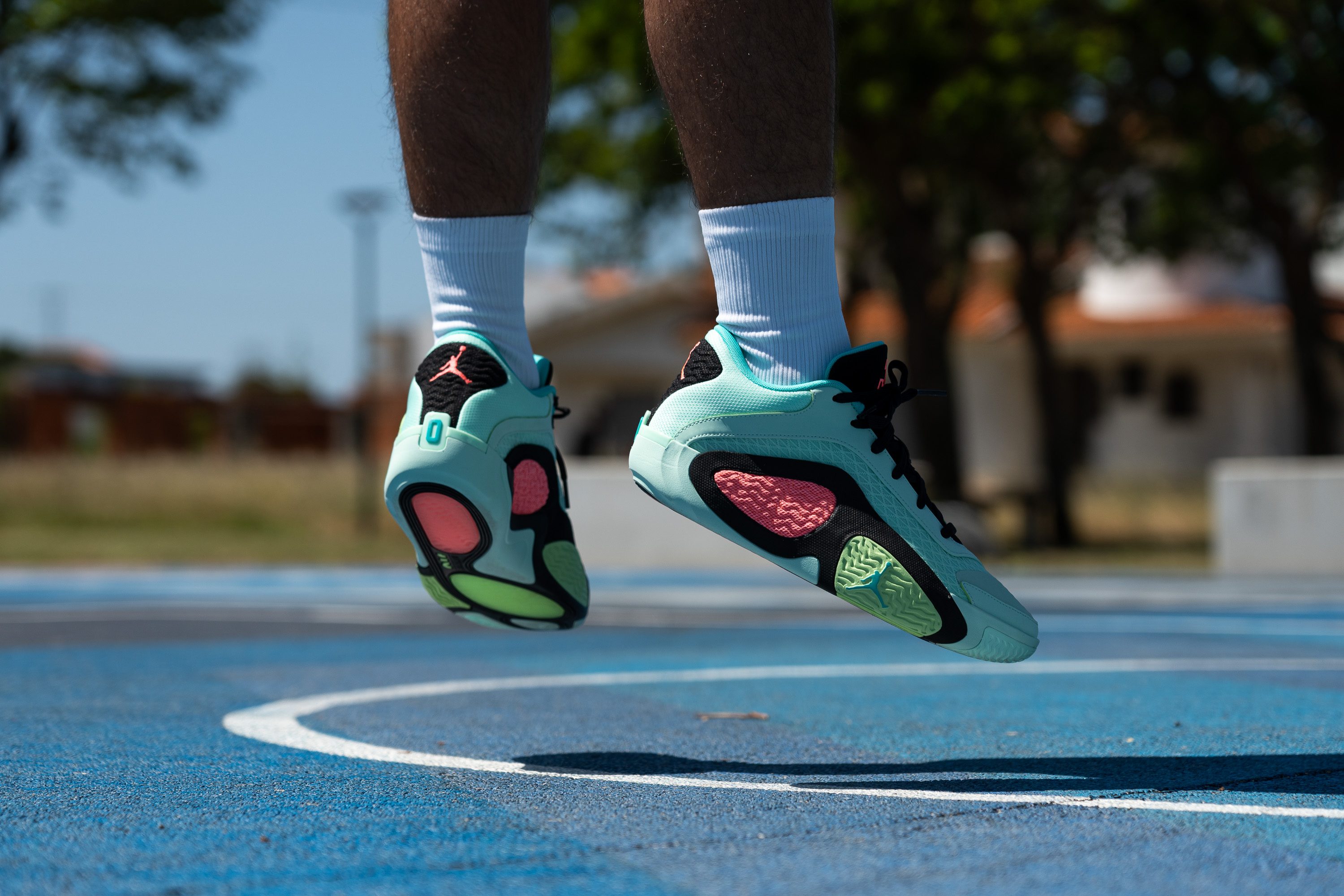
| Tatum 2 | 22.2 mm |
| Average | 21.4 mm |
Drop
As the heel stack is lower in the v2, yet the forefoot stack of both models is pretty similar, there's a change in this shoe's drop compared to its predecessor.
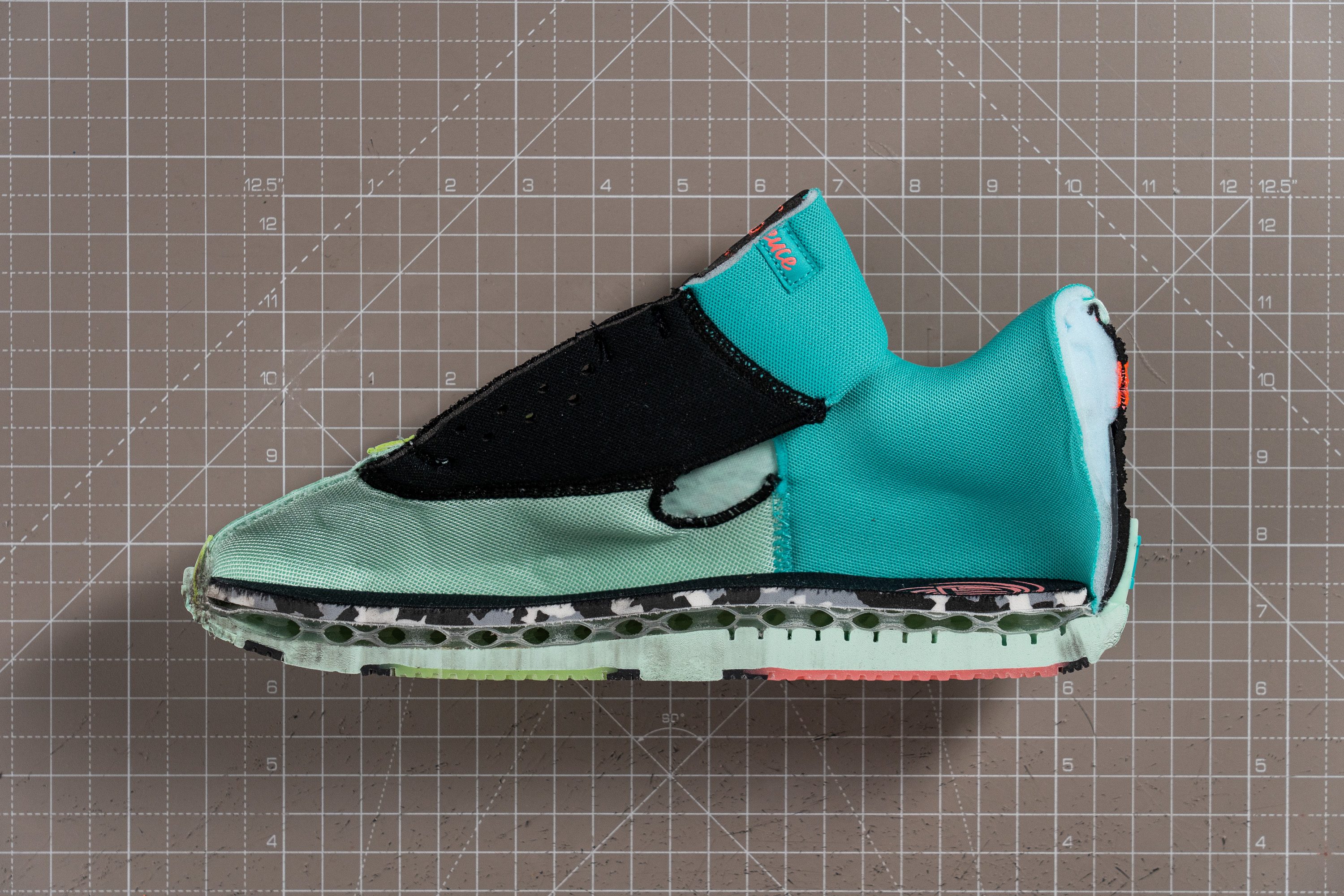
At 4.4 mm, the durable rubber of the outsole and the comfortable Air Strobel team up to offer you a closer-to-the-ground design.
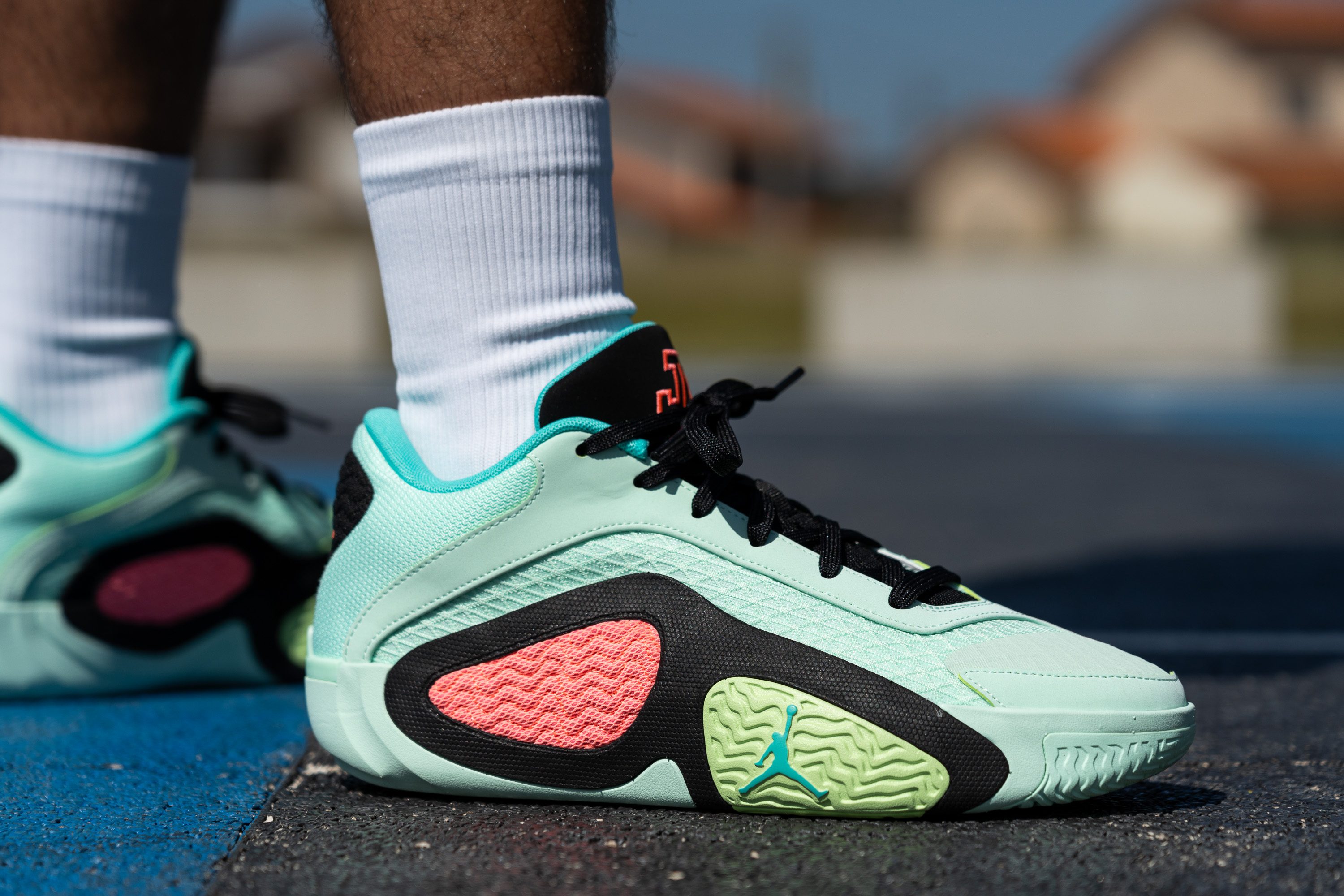
We really enjoyed this structure in our playtests, as we felt more in control compared to the previous version. We could perform the same cuts, dribbles, and fakes with no problem, but we felt more cushioned in our landings and safer overall.
| Tatum 2 | 4.4 mm |
| Average | 7.4 mm |
Midsole softness
When our durometer returned 38.6 HA, we realised how the brand had totally changed its approach on the midsole too.
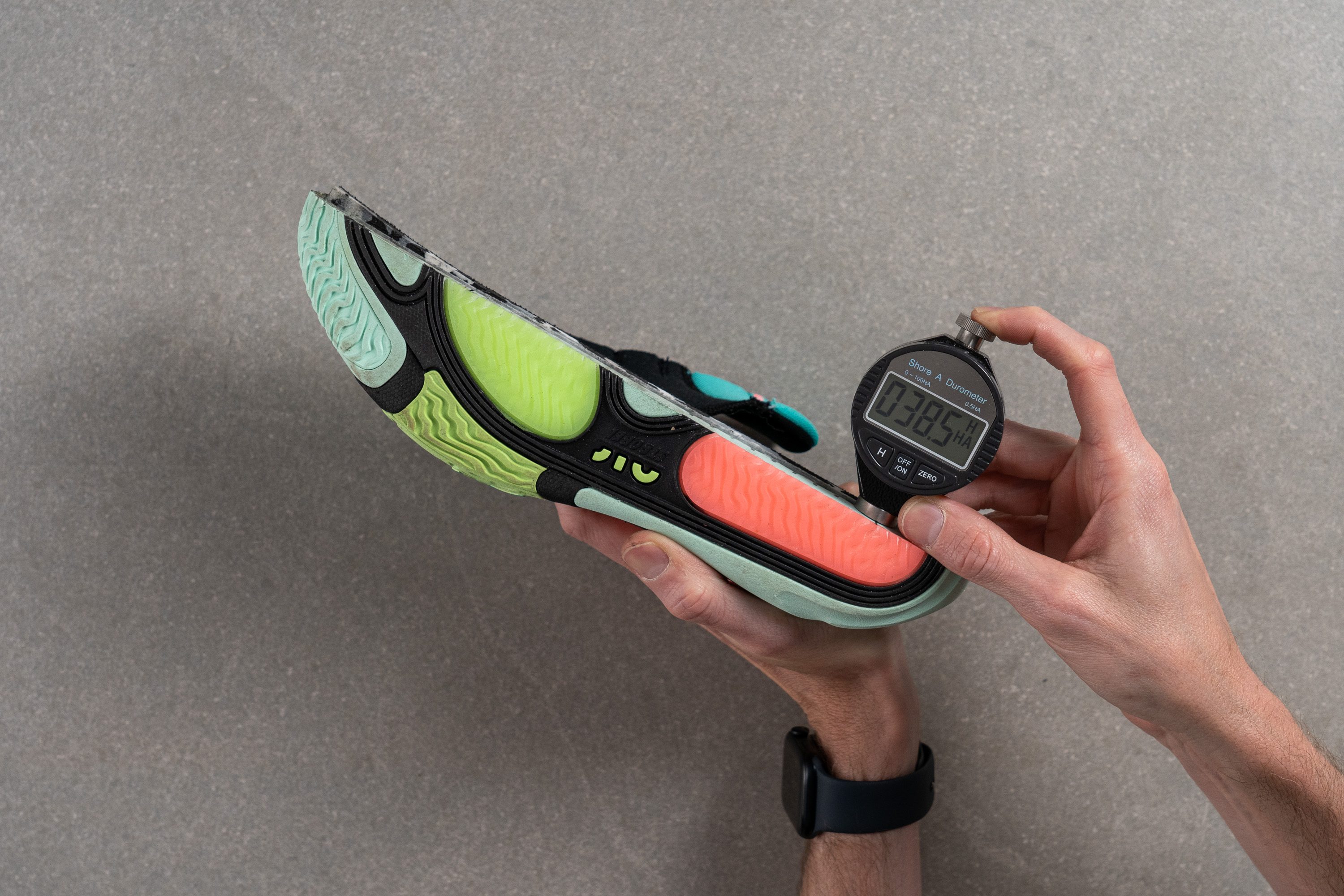
It's fully made with EVA, which is not known for being super plush. Nevertheless, the full-length Air Strobel made sure we still felt comfortable during our wear tests. This piece offered cushioning in terms of shock absorption, but we can't say it's the most bouncy model we've tried so far.
| Tatum 2 | 38.6 HA |
| Average | 24.3 HA |
Size and fit
Size
Jordan Tatum 2 fits true to size (20 votes).
Internal length
| Tatum 2 | 276.9 mm |
| Average | 271.7 mm |
Width / Fit
Having created a gel mould of the shoe's interiors, we measured its widest part at 92.1 mm. Slightly wider than average, it offers an accommodating fit.
However, as you can see from the shape of the mould, the Tatum 2 gets notably narrower towards the front.
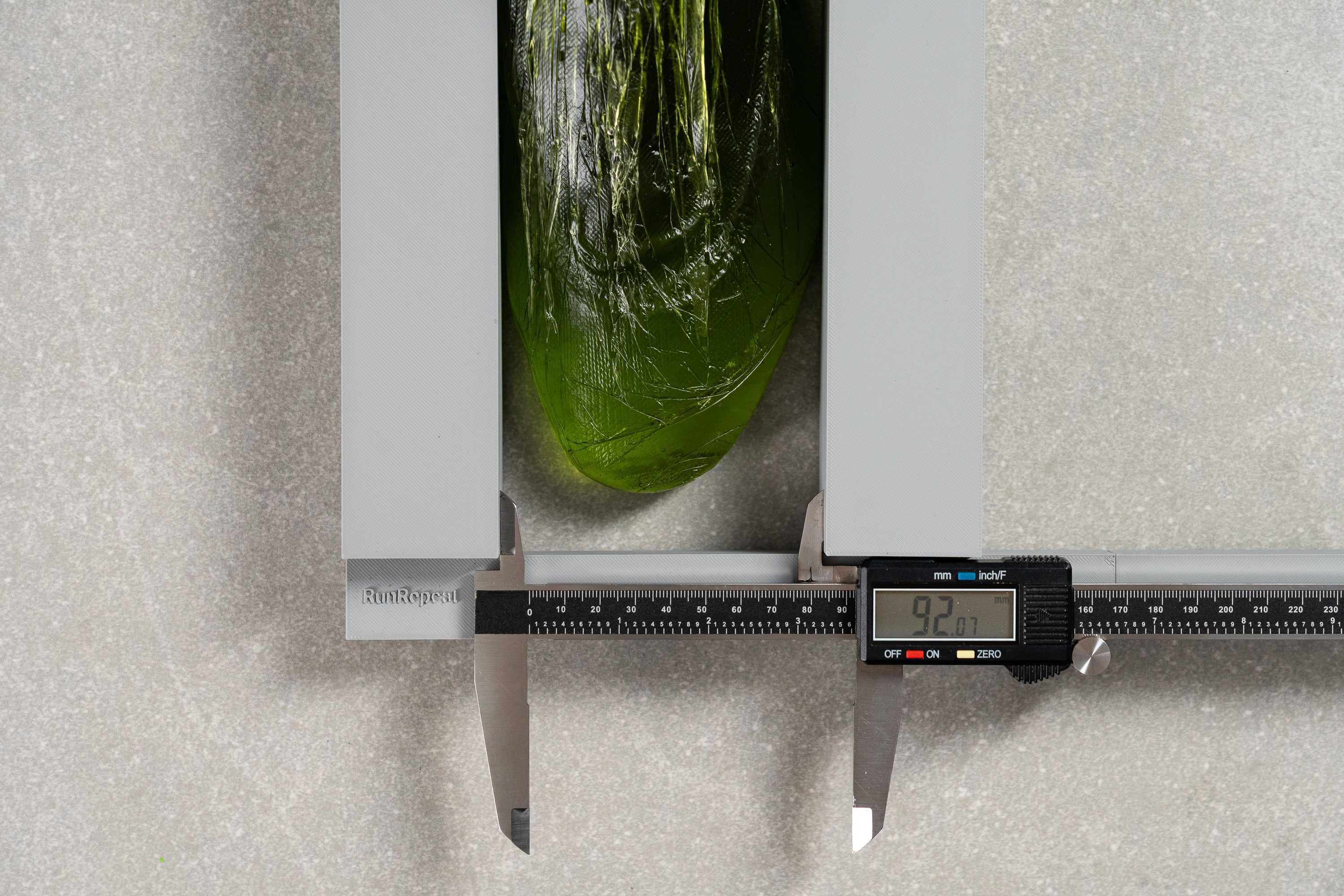
| Tatum 2 | 92.1 mm |
| Average | 92.8 mm |
Toebox width
With only 64.3 mm of width near the big toe, the shoe proved to be rather pointy. This limits its target audience to players with medium-to-narrow feet.
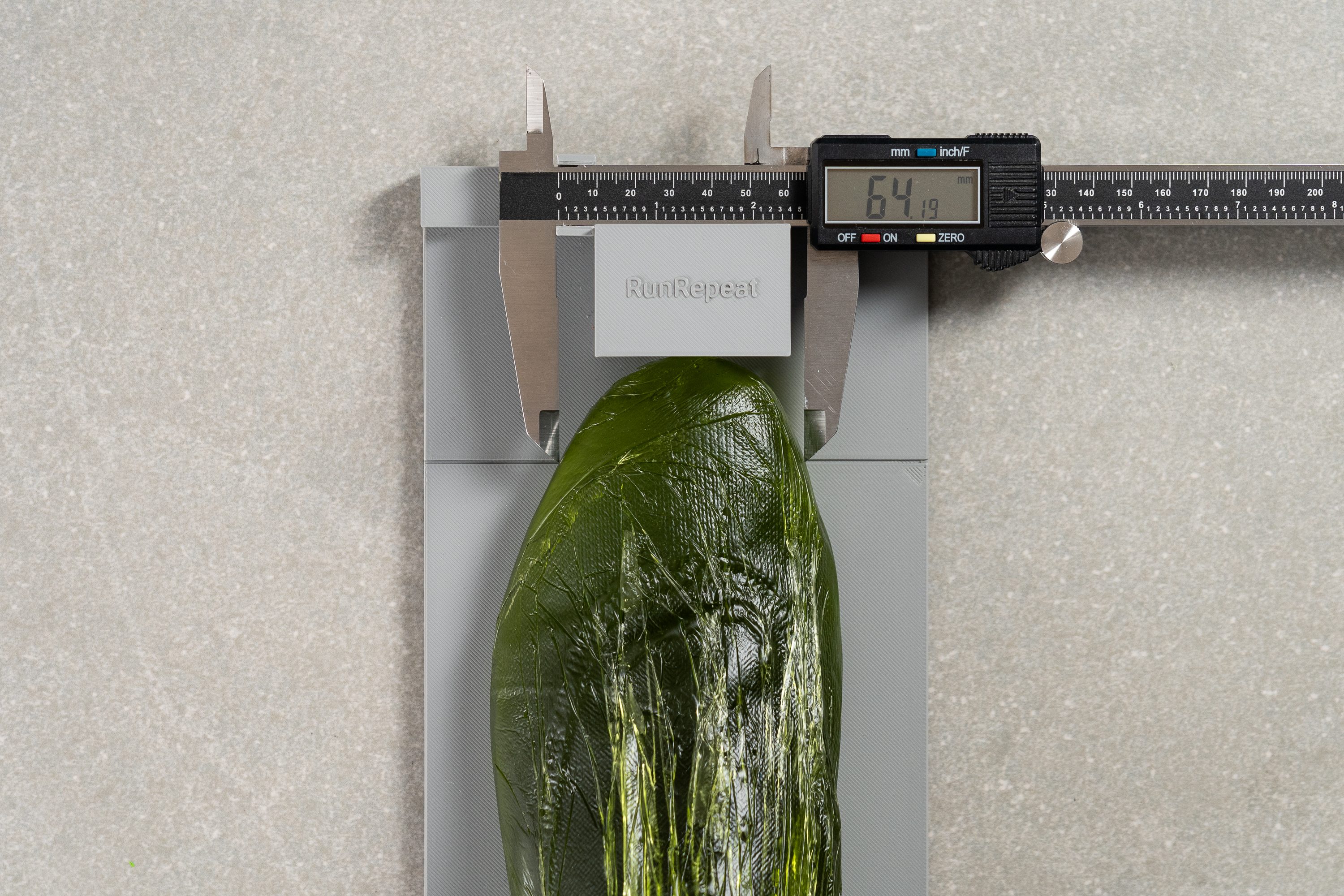
| Tatum 2 | 64.2 mm |
| Average | 69.3 mm |
Toebox height
The shoe's toebox gets shallower towards the toes too but, luckily, it doesn't get any lower than the standard 23.5 mm.
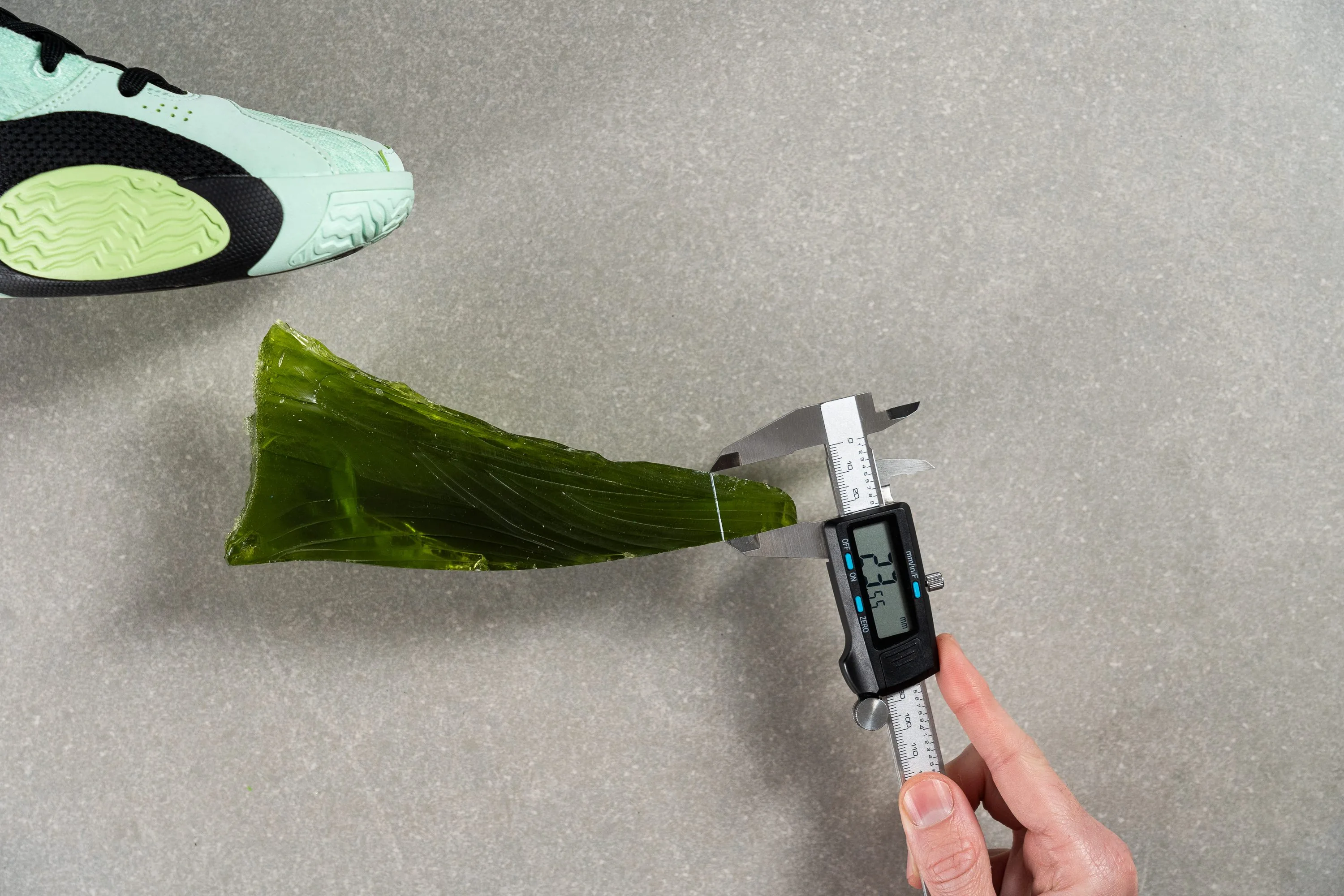
| Tatum 2 | 23.5 mm |
| Average | 23.5 mm |
Flexibility / Stiffness
Following the results of our torsional rigidity test, we did expect this shoe to be quite stiff.
At 49.5N, our gauge gave us a higher score than the average, which is something we already knew. Why? Well, because during our wear tests we could feel this shoe didn't want to completely bend with our feet when we were running up and down the court.
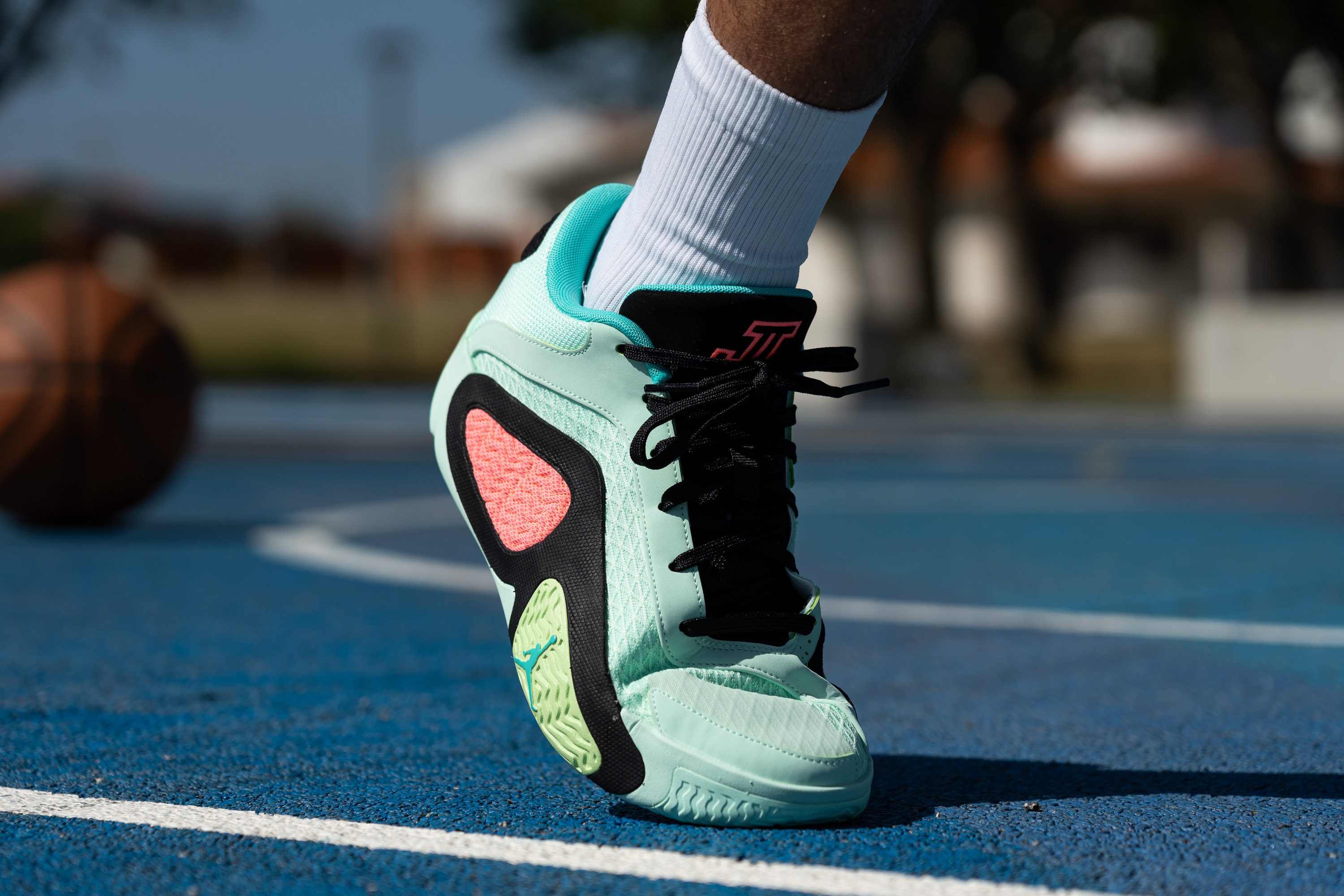
Our stride didn't feel as smooth as with the previous iteration of this shoe. We really liked this stiffer structure for our layups and cuts, as it gave us an overall more solid feel. Nevertheless, we didn't enjoy it that much for shooting. When you fake shoot or when you train shooting mechanics, your feet are constantly bent on the ball of the foot.
It might sound redundant, but trust us: it does make a difference.
This test follows an older methodology, which is why you don't see recently tested shoes in the chart. Results from different methodologies can not be compared.
| Tatum 2 | 49.5N |
| Average | 38.8N |
Weight
The sturdier materials chosen for the v2 of this shoe came with some added weight.
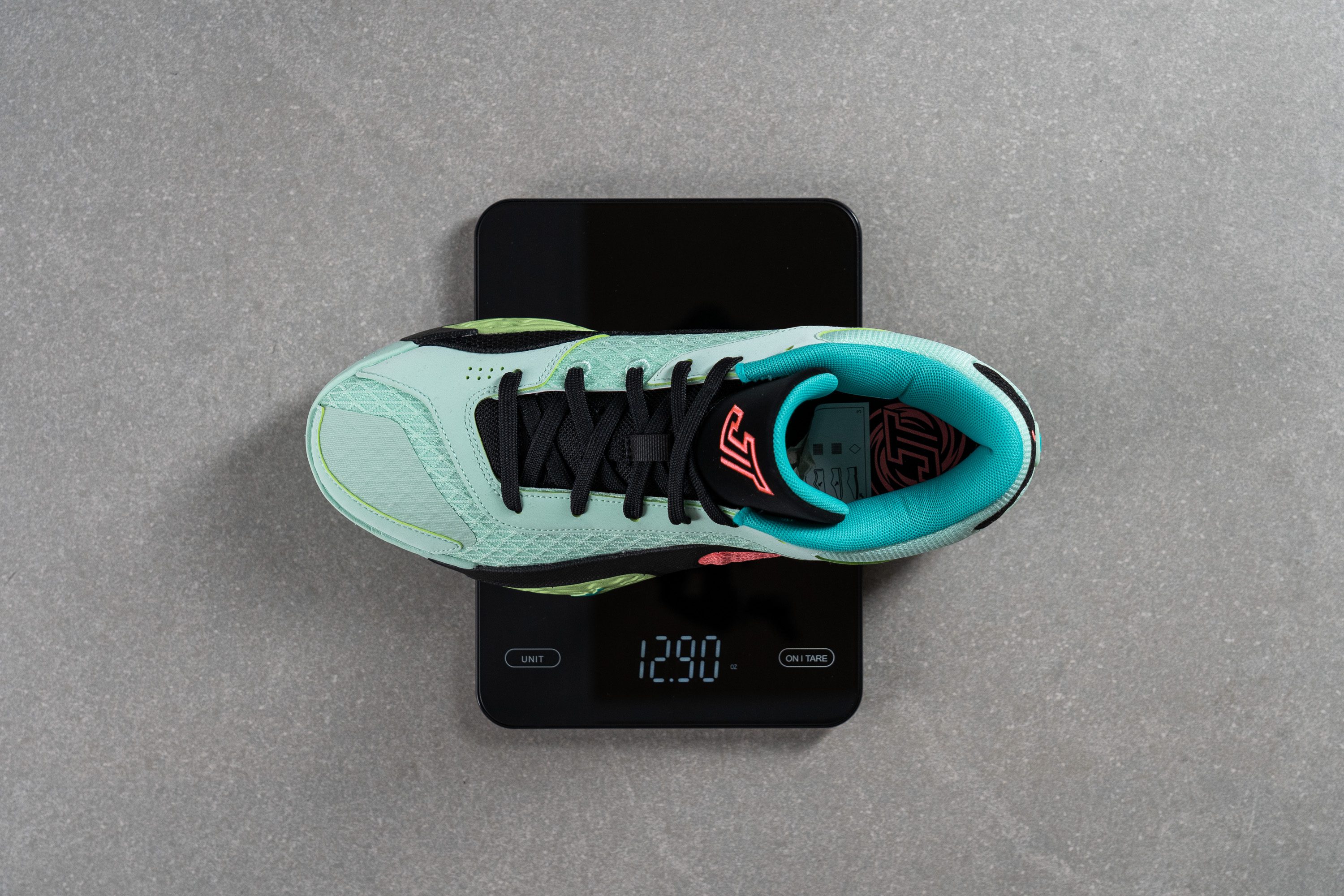
At 12.9 oz / 366.0g, this model is heavier than its predecessor, but it's still way lighter than average, so we didn't mind it. Our feet didn't feel dragged with it or anything like that.
During our playtests, the Tatum 2's light nature helped us perform aggressive and quick moves. Nevertheless, its rigid structure (we'll talk about this later on in this review) didn't let us enjoy its lightweight that much.
| Tatum 2 | 12.9 oz (366g) |
| Average | 13.8 oz (391g) |
Breathability
For our breathability test, we use a smoke machine, a microscope, and a light. We start off by filling the shoe up with smoke, and then we patiently wait and see how, when, where, and how much of it actually manages to come out.
Compared to the Under Armour Curry 10, which scored a perfect 5/5 in this ventilation test, our Jordans couldn't let that much smoke out. Still, we could see a constant streak coming through the tongue, so we decided to give this model a 2/5.
As we can see in our light test, this is mainly thanks to the multiple wholes its tongue has. They let the smoke come out much better than any other area in the shoe.
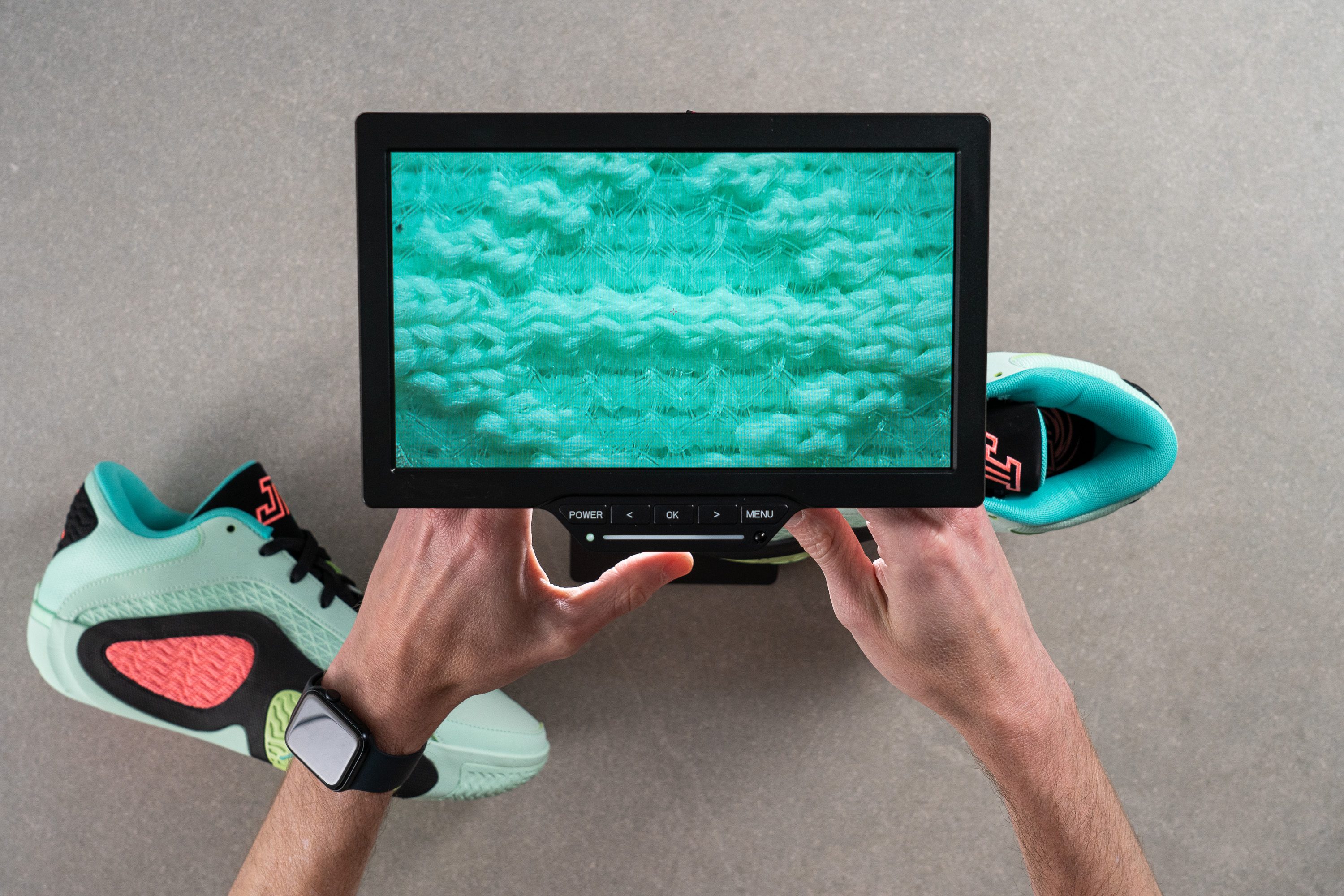
The tightly woven material of these hoopers wouldn't be the one to smoothly allow the air to come in and out!
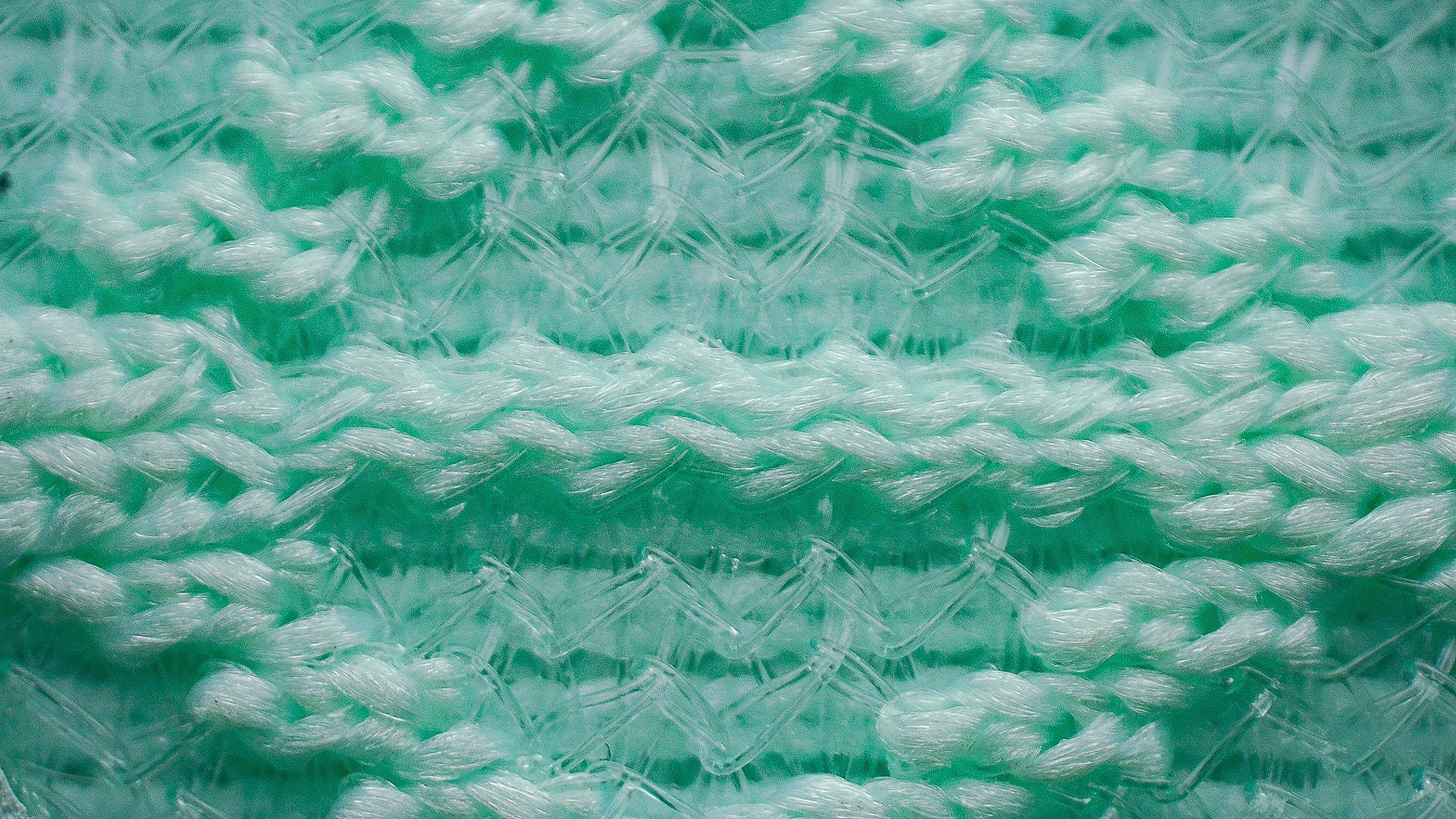
Just look at how thick it is, the tongue definitely saved the day!
| Tatum 2 | 2 |
| Average | 2.5 |
Stability
Lateral stability test
Lateral stability is a key feature of basketball shoes. If you've played this sport for long, you most likely know people who have sprained their ankles, or maybe it's happened even to you. That's why it's crucial for your feet and yourself to feel safe and locked in properly when you go for a new pair of hoopers.
As you can see in the video, our ankles didn't wobble during our wear tests. This was something that we enjoyed in the previous version too, but there has been a great update regarding the whole shoe's design.
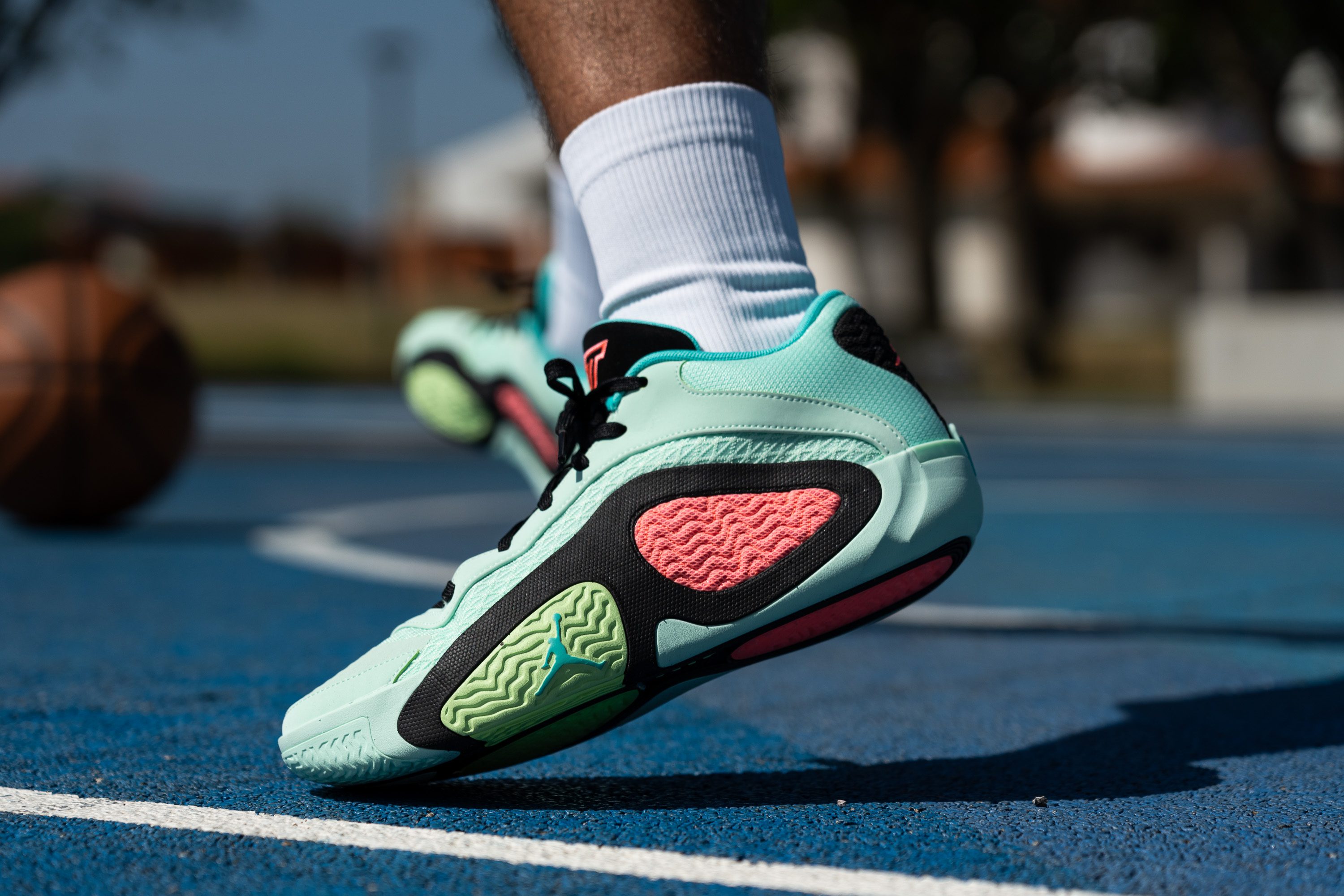
Now we can see a solid structure that offers support and surefootedness, which was our experience in our playtests. Once again, this was most likely a "listen and learn" experience for Jordan, as the previous version was way more unstable. In order to explain this a bit better, we're going to show you a picture of the Tatum 1.
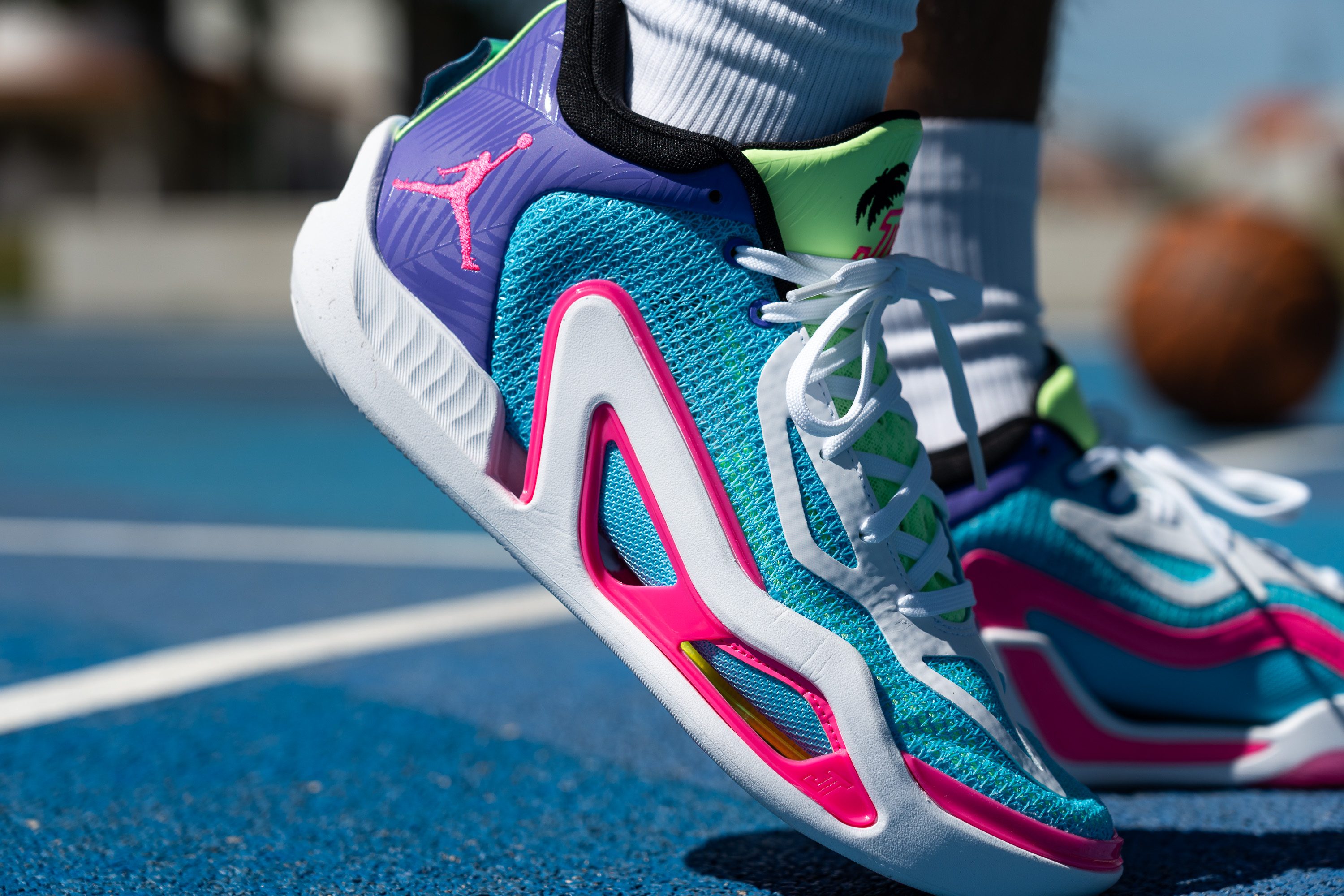
Can you see the small linear gap? With this shoe, the forefoot was fine, but the mid and the rearfoot didn't feel great to us. There was a strong lack of arch support, and overall we felt a bit unstable.
This is something Jordan made sure was fixed for this new version. There's always room for improvement, though, but we feel the brand definitely listened to its customers complaints.
Nice, Jordan! Keep it up for the v3!
Torsional rigidity
Earning the highest grade in our torsional rigidity test, the Jordan Tatum 2 made sure our feet felt safe with its solid and well-structured design.
You can see our thumbs clearly struggling to bend the shoe. It felt like an armour for our feet!
This is good news for those who appreciate foothold and lockdown, but having such a rigid structure definitely takes a toll on flexibility. We'll discuss this aspect later on, yet in the previous video you can already see this model doesn't bend easily in the ball of the foot. This made our transitions less smooth, but that's the price to pay, though!
It's pretty clear in this example of us running down for a defensive balance. Can you see the toebox's lack of flexibility?
| Tatum 2 | 5 |
| Average | 4.5 |
Heel counter stiffness
Despite its whole structure being way more rigid than the previous version, the Tatum 2's heel counter stiffness remains the same.
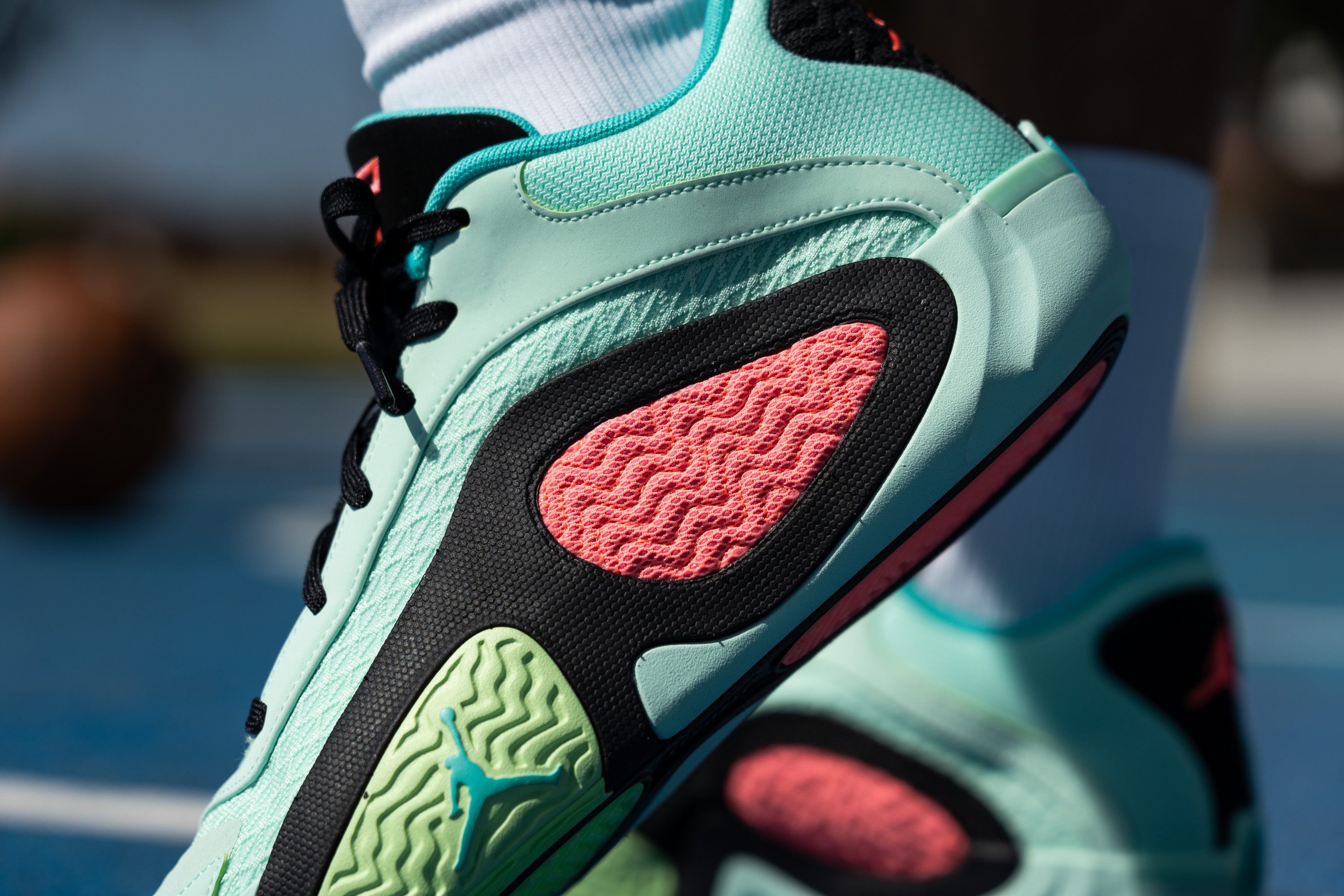
This part of the shoe is nicely padded, and we loved that. If you'd want it to have a snugger fit, you can always use the extra top eyelet this shoe has. That's what we did during our wear tests, and it helped our feet feel safer!
| Tatum 2 | 3 |
| Average | 3.8 |
Midsole width - forefoot
At 113.5 mm, this shoe's midsole width in the forefoot is close to the average.
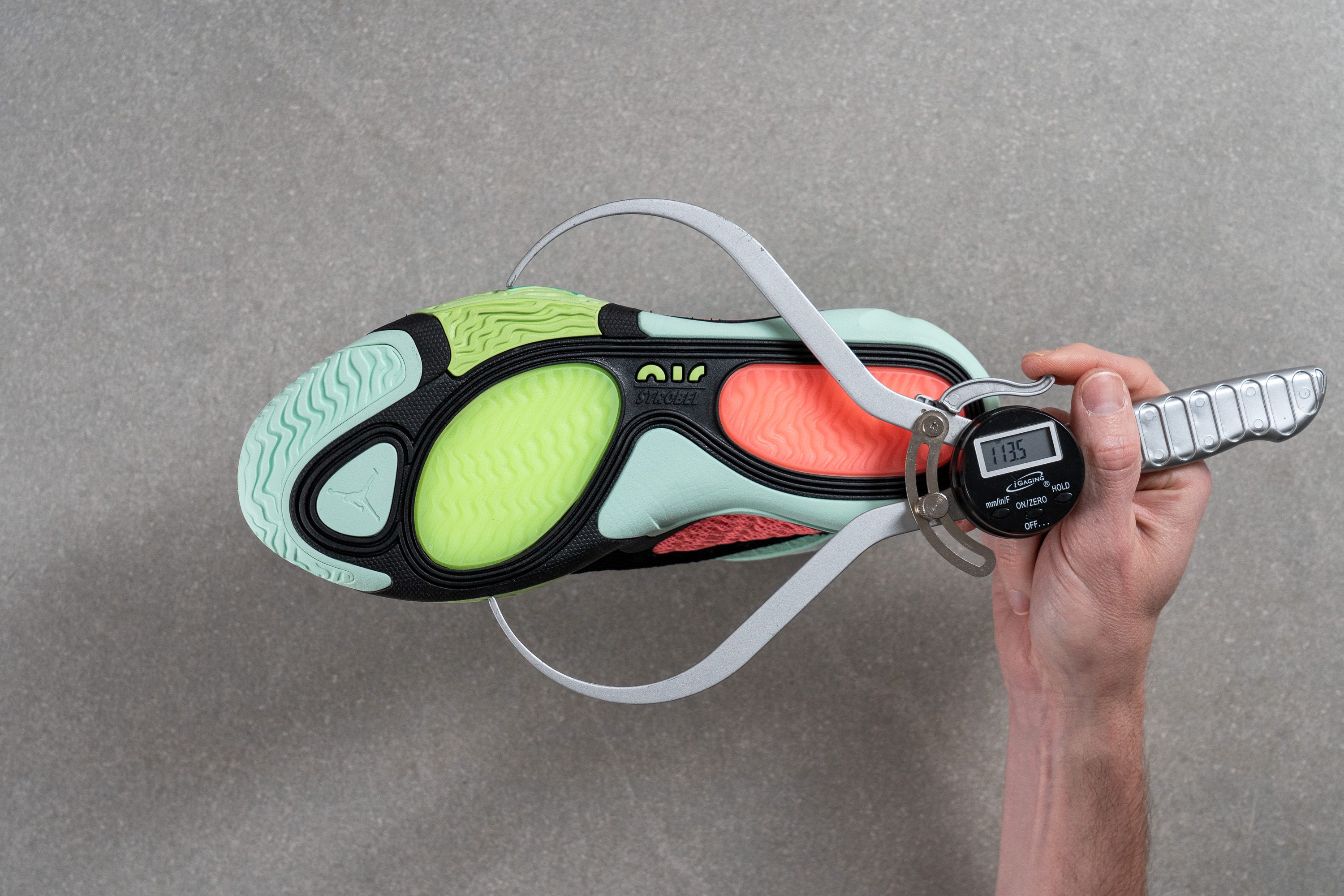
Even though our calliper returned a number slightly lower than average, our standard-width feet didn't even realise.
| Tatum 2 | 113.5 mm |
| Average | 114.8 mm |
Midsole width - heel
At 85.5 mm, our calliper told us that Jordan went for a snugger fit in the heel. We didn't experience any heel slippage during our playtests, which is something that we always appreciate.
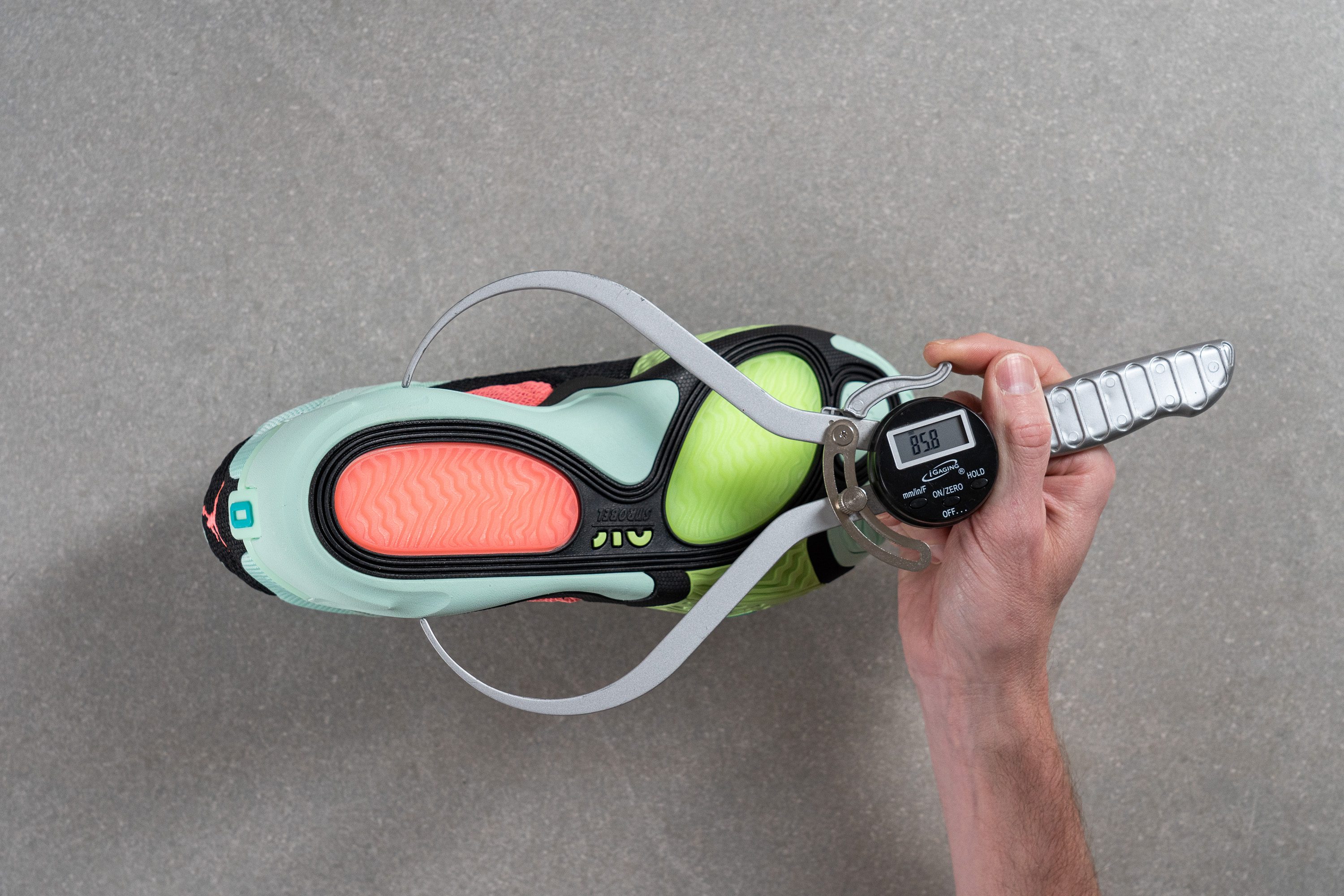
| Tatum 2 | 85.8 mm |
| Average | 89.7 mm |
Durability
Toebox durability
At the very same moment we took this shoe out of its box, we could already tell it was made to last. Our eyes didn't deceive us when our Dremel decided to pick up a fight and... lost it.
We always put our tool in the same spot. This helps us keep our results coherent and comparable, which makes the grading system we use much easier to understand.
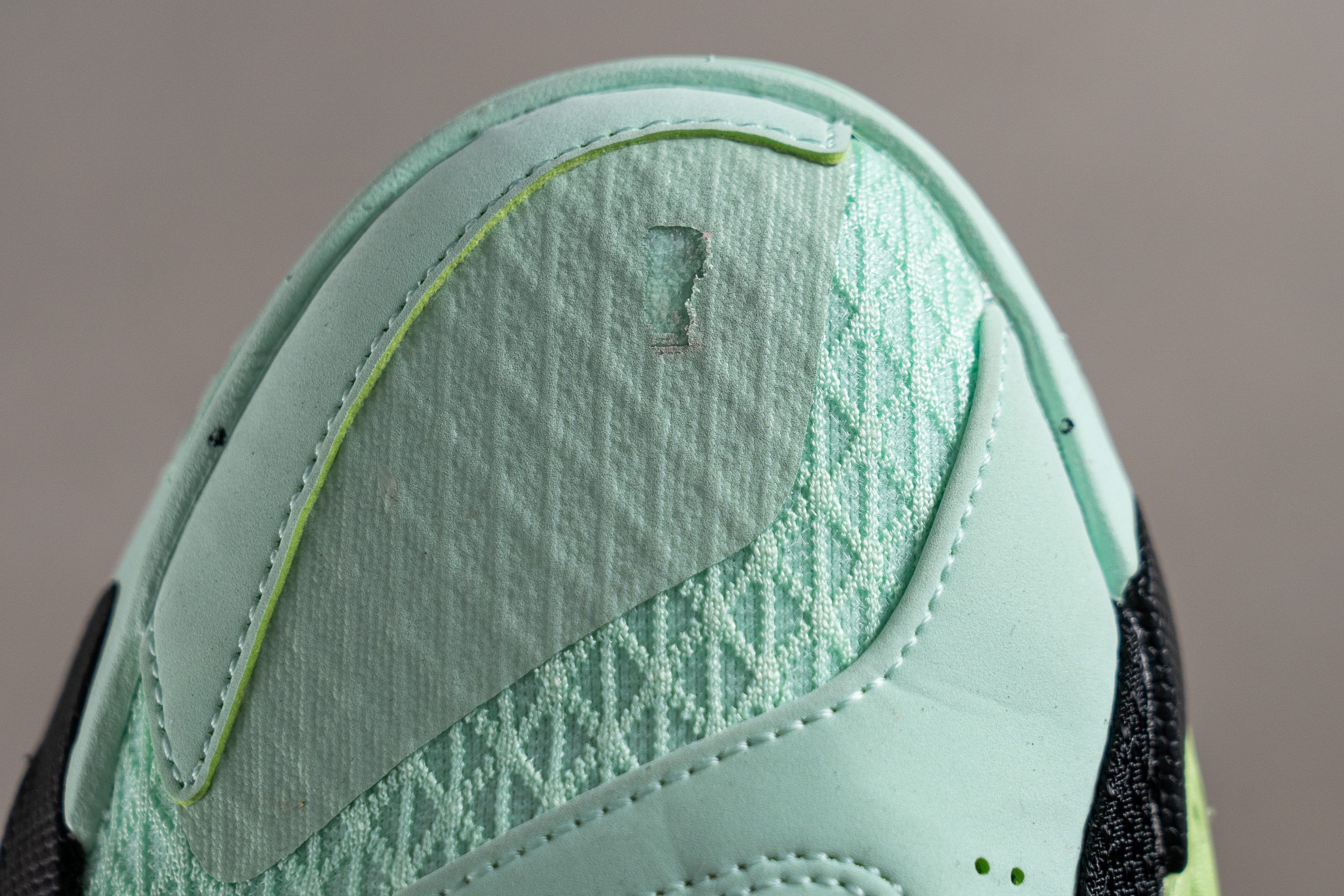
As you can see in the picture, there's an extra layer protecting the textile of the toebox. Our Dremel made its way through it, but that was pretty much it. We were very happy with these Jordans' results, as they scored a well-deserved 4/5 in our toebox durability test.
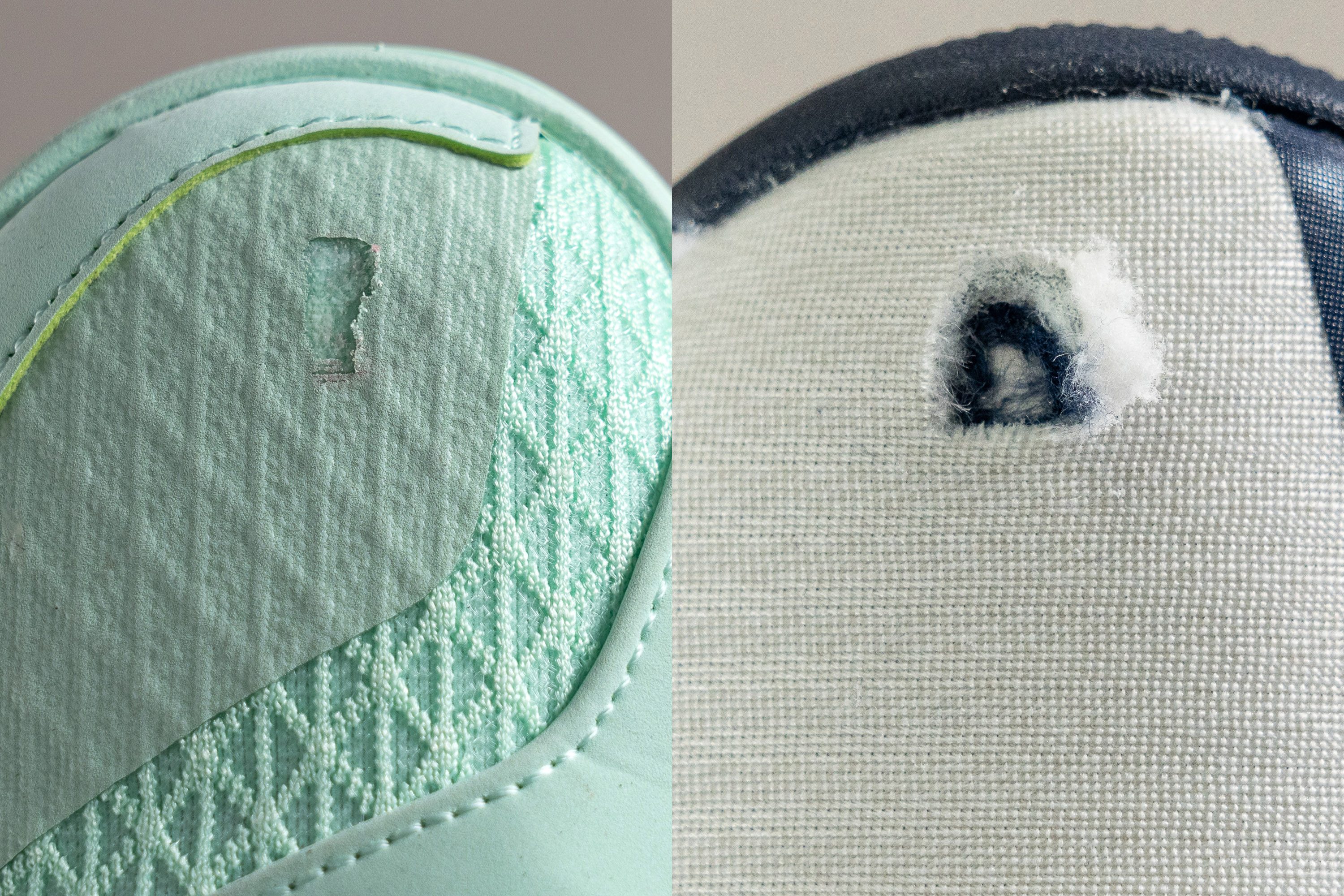
On the left we have our shoe, the Jordan Tatum 2, and its solid toebox. On the right, the Nike Precision 6 and its devastating 1/5 in our durability test!
Compared to its predecessor, this shoe has improved its defensive system! (from 3/5 in the Tatum 1 to 4/5 in the Tatum 2).
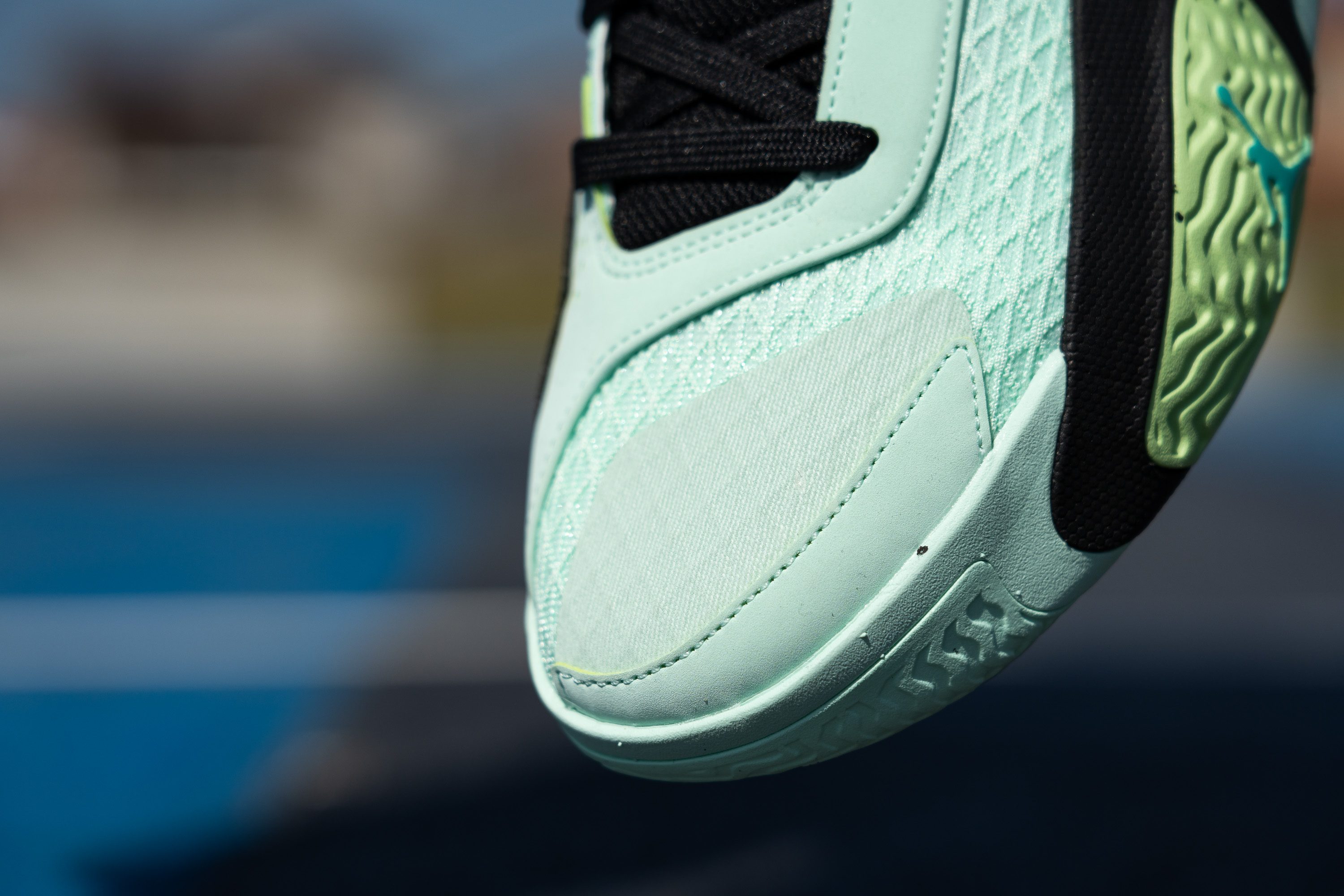
| Tatum 2 | 4 |
| Average | 3.7 |
Heel padding durability
We're more than happy to tell you that this second version keeps improving.
Our Dremel was ready for the next round, and this time we moved it all the way to the back to test the heel padding durability.
Impressed by its armour-like nature once again, this shoe's materials were ready to withstand the rolling attack of our tool. Scoring a fantastic 4/5 in our heel padding durability test, the Tatum 2 is ready for the constant Achilles rubbing that this sport requires.
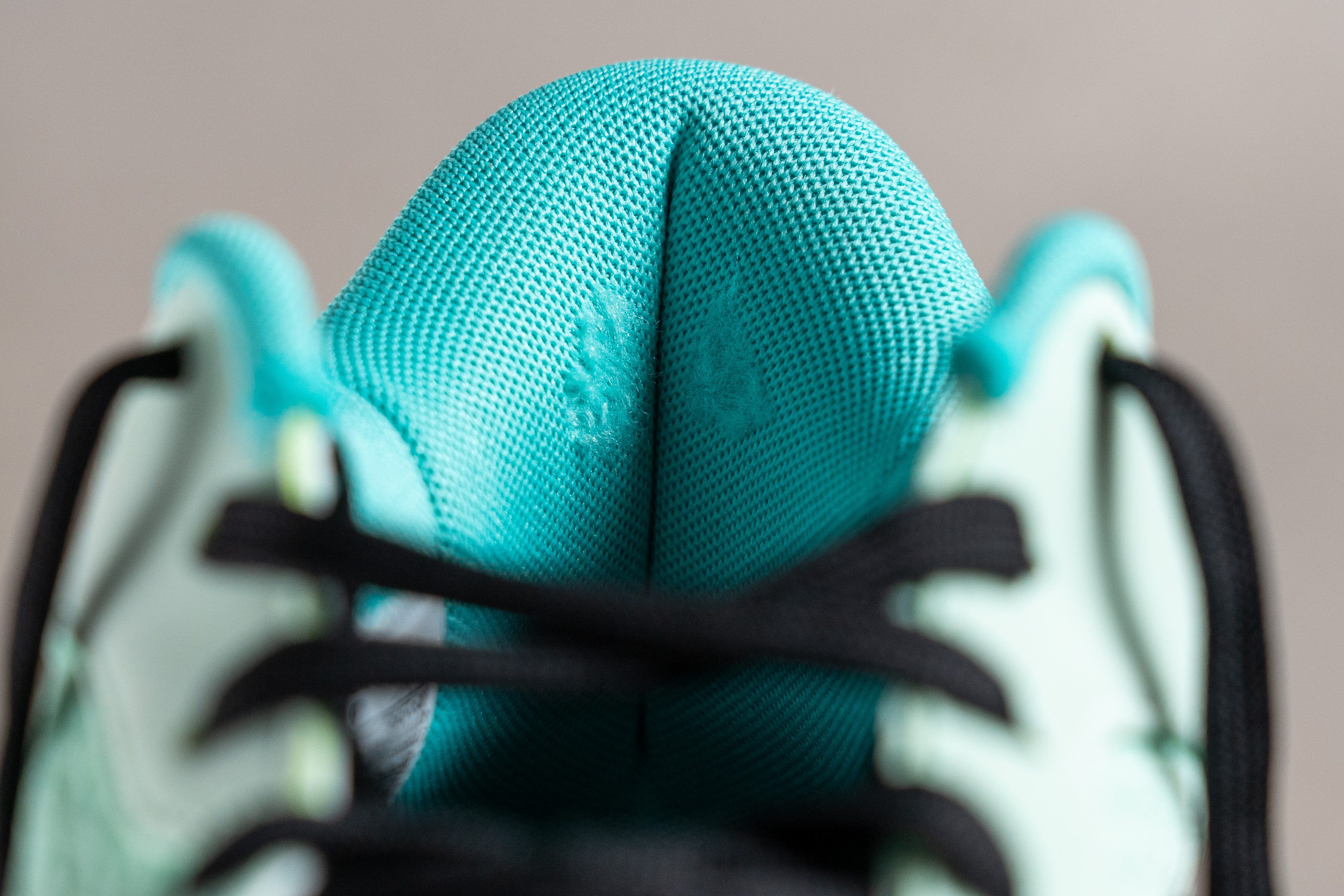
You can easily see it in the picture. Our Dremel's attack didn't put the shoe's integrity at risk, and we loved it!
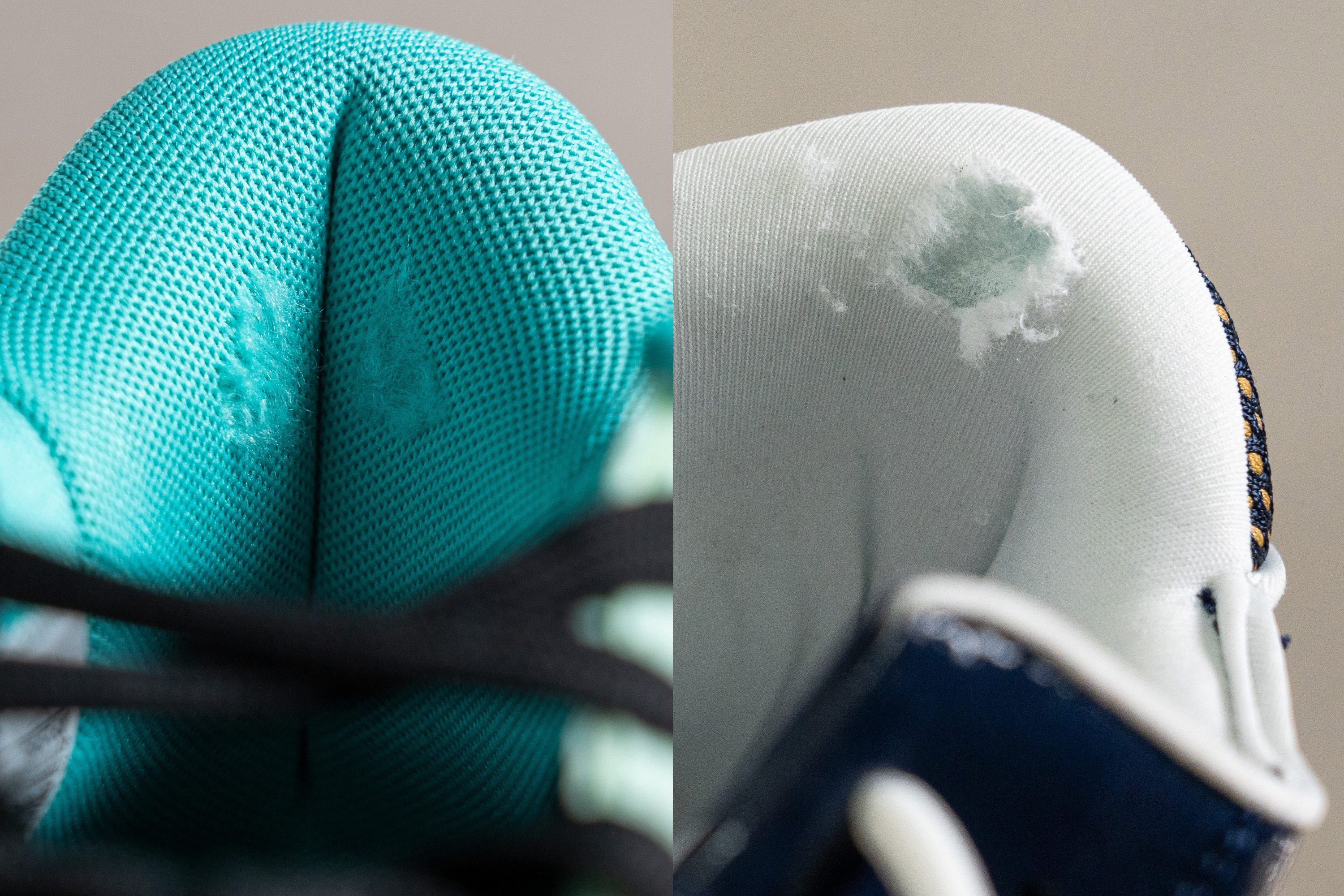
On the other hand, the Answer DMX's experience was much worse. You can see the material is all torn, and there's a considerable dent in the padding. That's why this Reebok couldn't get more than a 1/5 in our heel padding durability test.
| Tatum 2 | 4 |
| Average | 3.7 |
Outsole hardness
The approach Jordan used regarding the outsole is completely different from the previous version.
Before we dive into this, let's compare our durometer results in the outsole hardness test we performed in the lab.
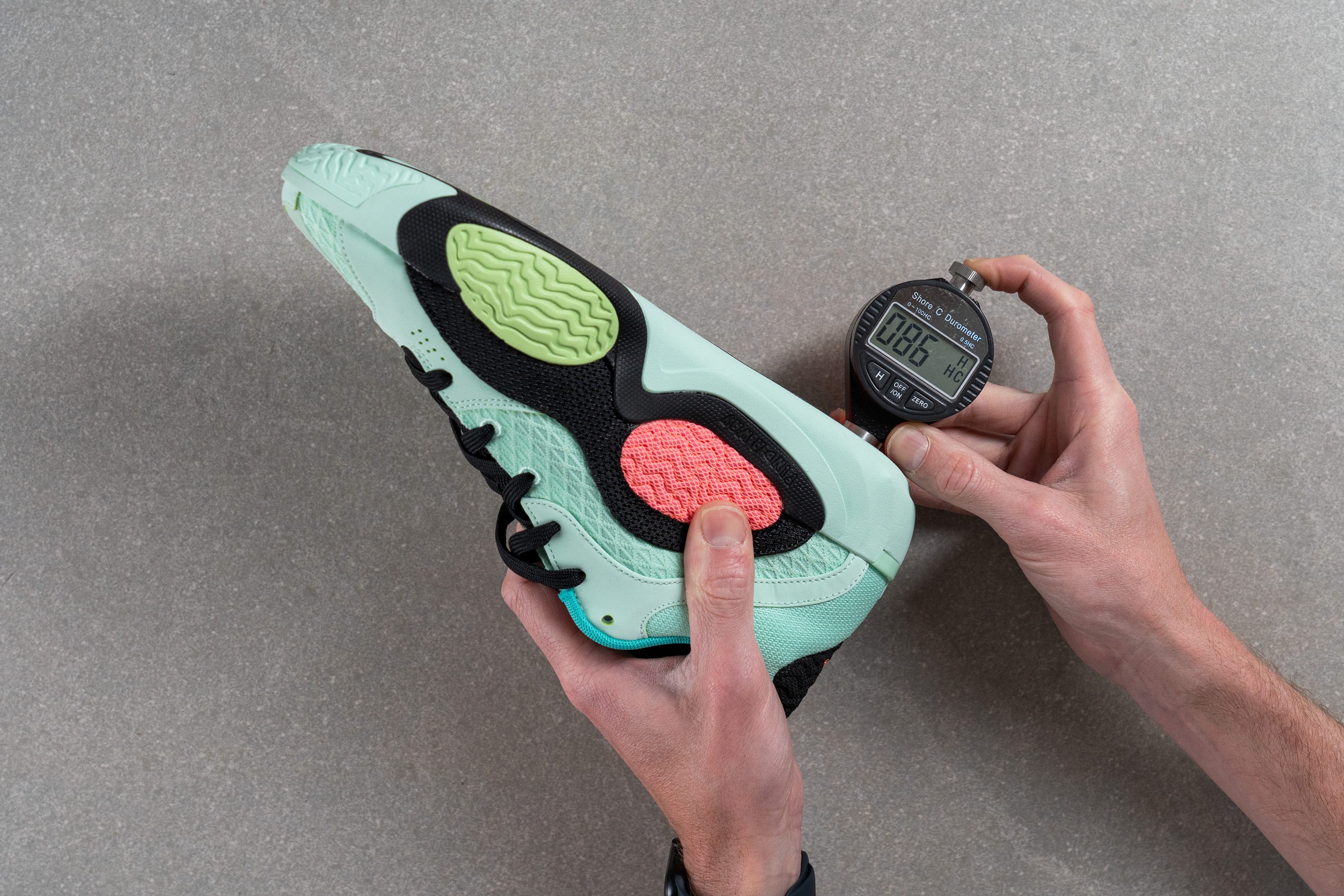
At 86.1 HC, the Tatum 2's score is not only higher than average, but also an incredibly 29% harder than the Tatum 1's. This usually means a higher durability, as the material is more resistant to abrasive elements.
| Tatum 2 | 86.1 HC |
| Average | 81.5 HC |
Outsole durability
As we were saying, this difference in the outsole has been absolutely game-changing.
It looks like the brand listened to the users' complaints about this part of the shoe, and we couldn't be happier. If you don't have the Tatum 1 or you're not familiar with its outsole controversy, let us sum it up for you real quick with a picture and a couple of key points.
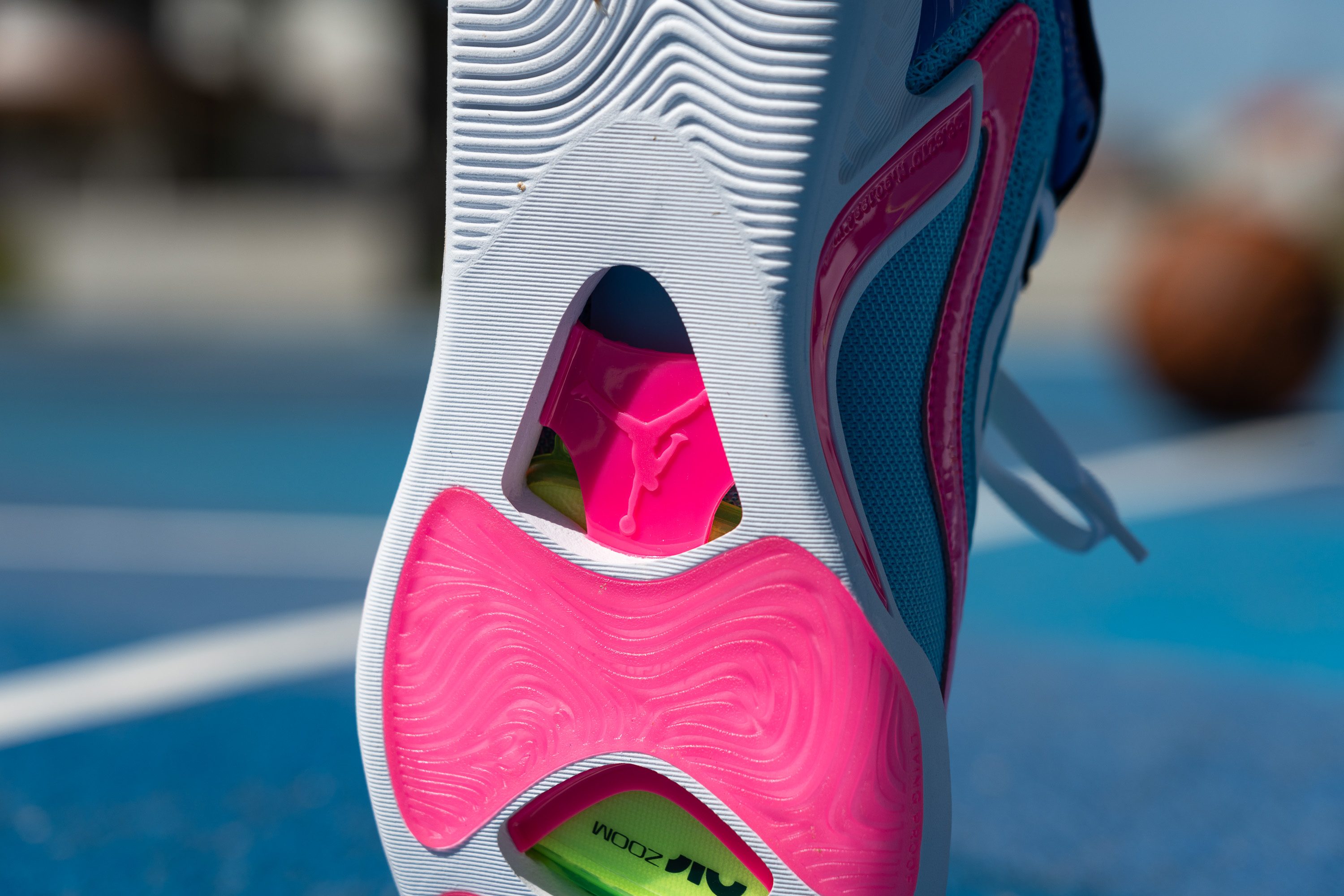
This is what the Tatum 1's outsole looks like. As you can see, there are clearly two different materials: a big pink rubber pod and a white bed, which is the midsole's material. The thing with this outsole is that the pink part is very durable, as stated by our Dremel test, yet the white one... is lacking in this aspect.
We performed the same test on both shoes. As usual, we grabbed our tool and went for the heel to measure the durability of its materials.
It tried to make its way little by little, but the v2 of this model showed great resistance. It ended up with a dent of 0.8 mm, which is a far greater result than the one the v1 got.
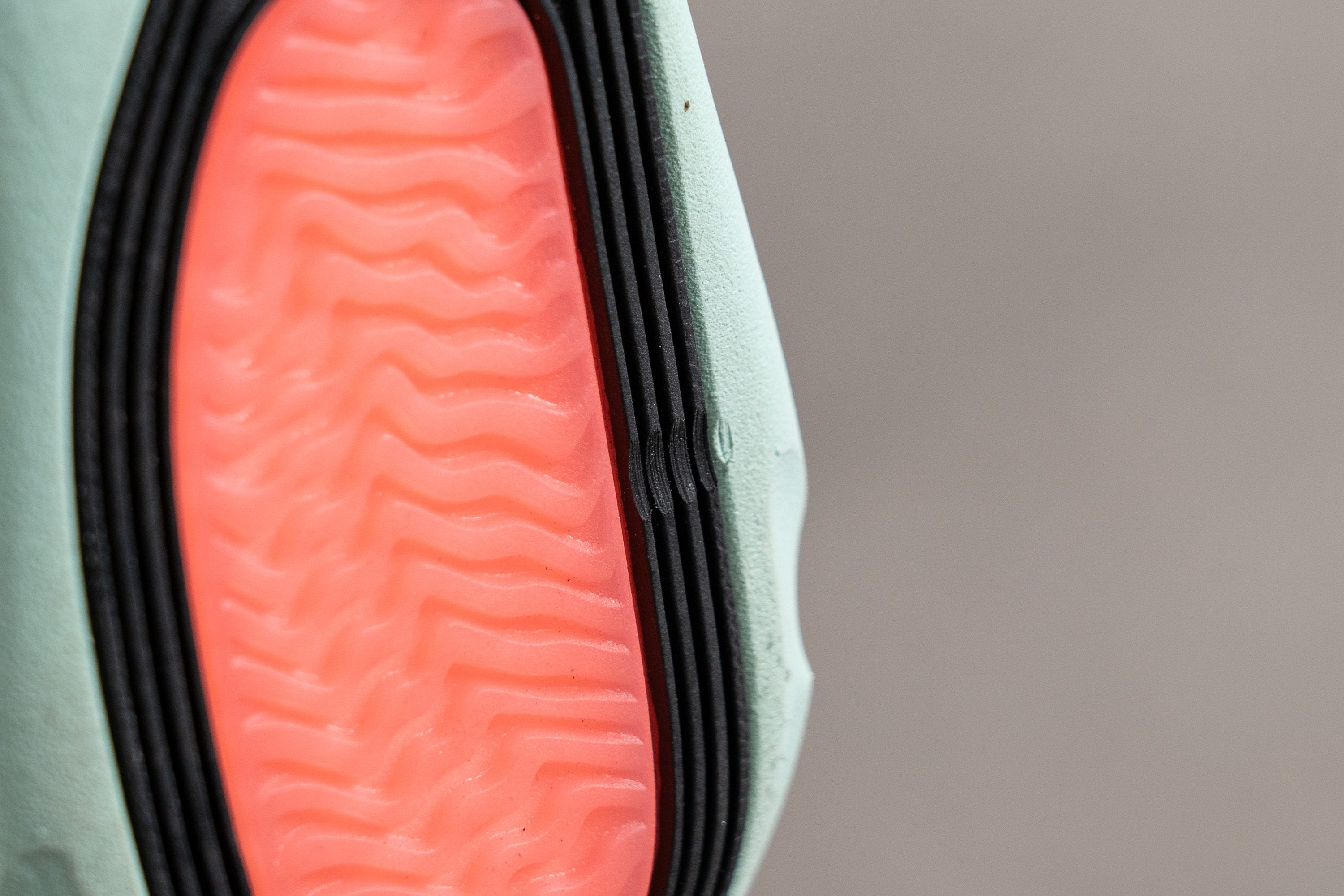
No words are needed, we'll just show you a picture of the damages the Dremel left in the Tatum 1 so you can see how big the difference is.
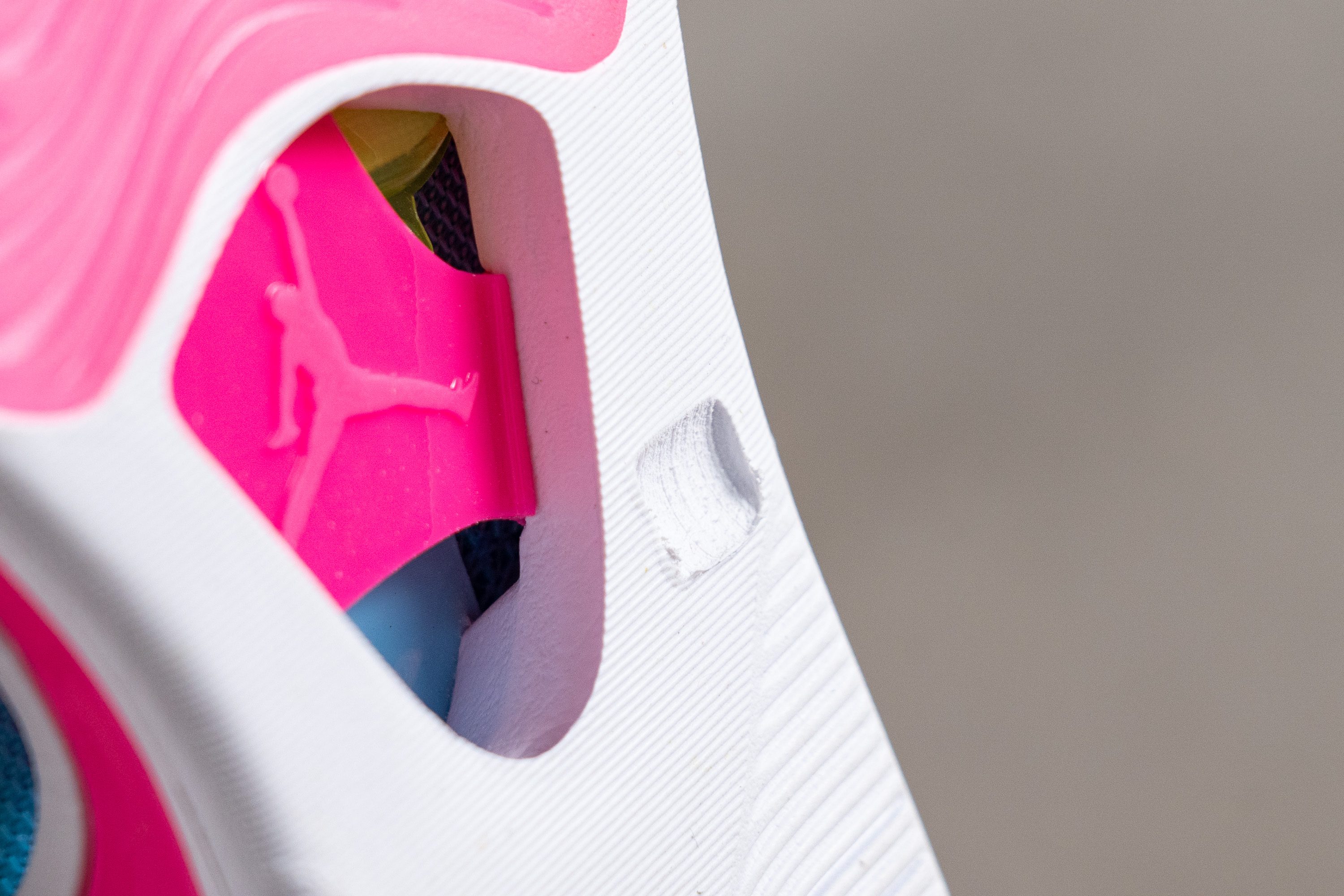
| Tatum 2 | 0.8 mm |
| Average | 1.0 mm |
Outsole thickness
At 3.1 mm, this shoe's outsole is thinner than average.
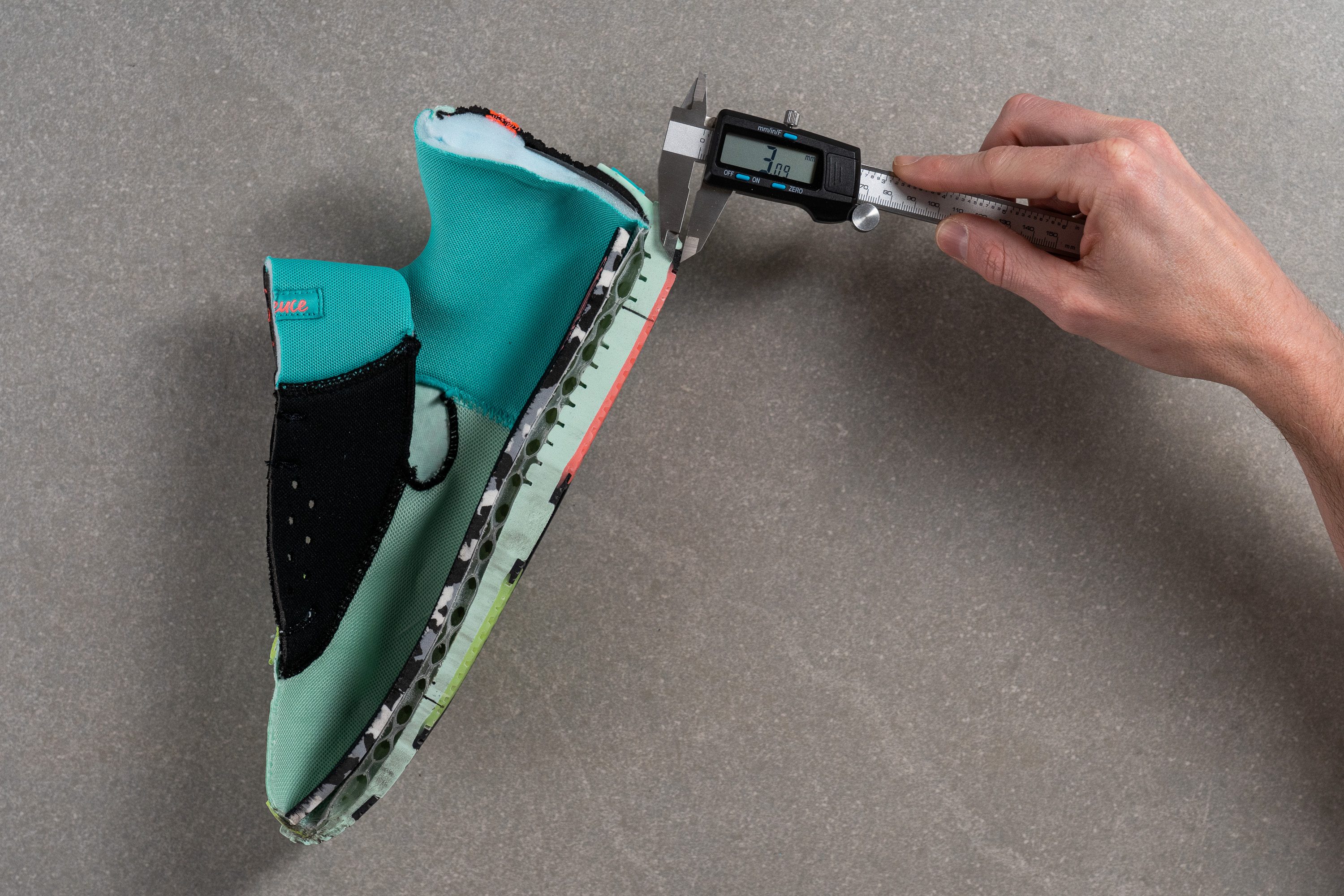
We believe this is a fair decision coming from the brand. In other words, the outsole's material is hard enough for it not to be incredibly thick, and adding more mm would also add more oz/g to the overall weight of the shoe.
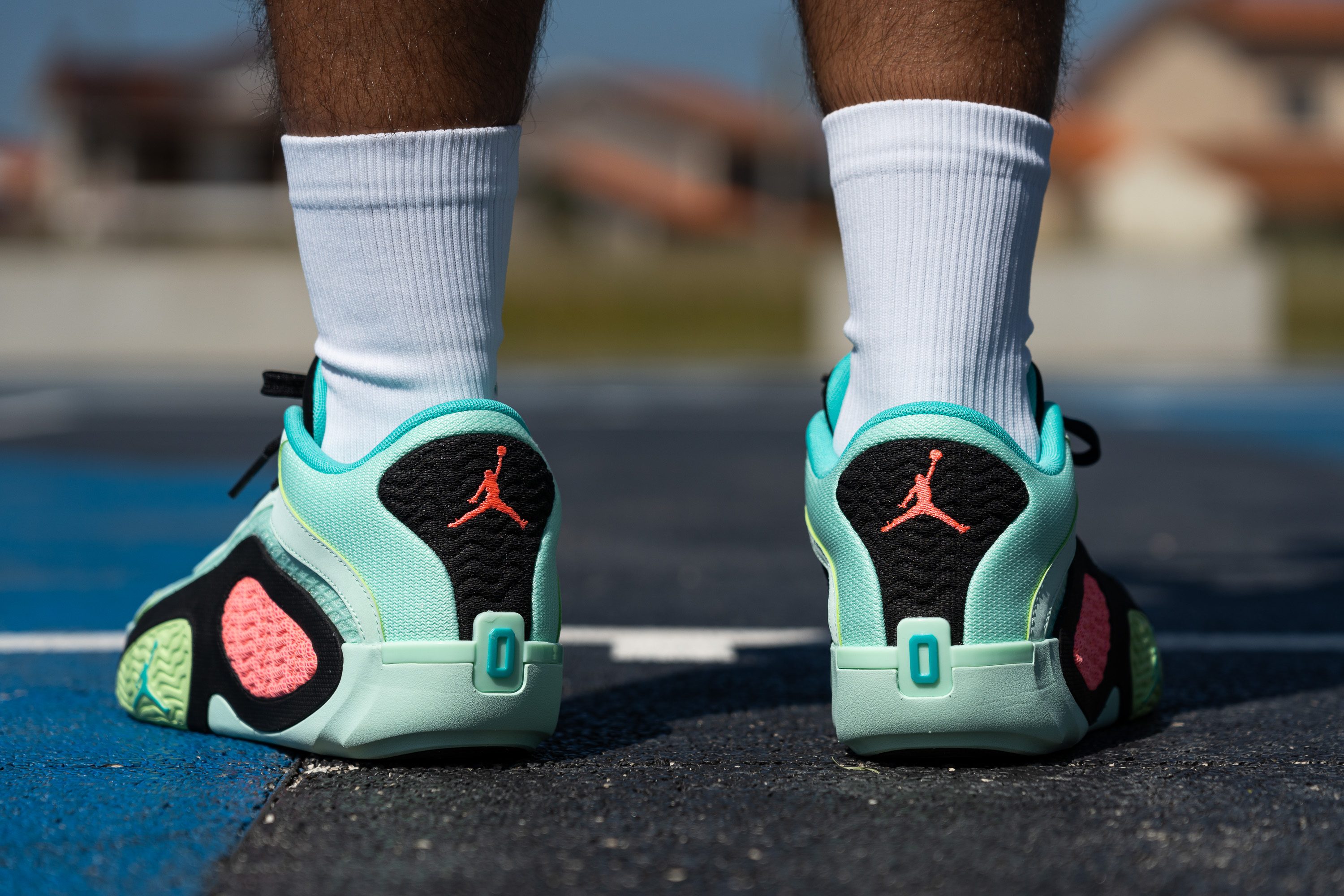
Nice one, Jordan!
| Tatum 2 | 3.1 mm |
| Average | 4.0 mm |
Misc
Insole thickness
At 5.0 mm, this shoe's insole is thicker than average, which makes it more comfortable.
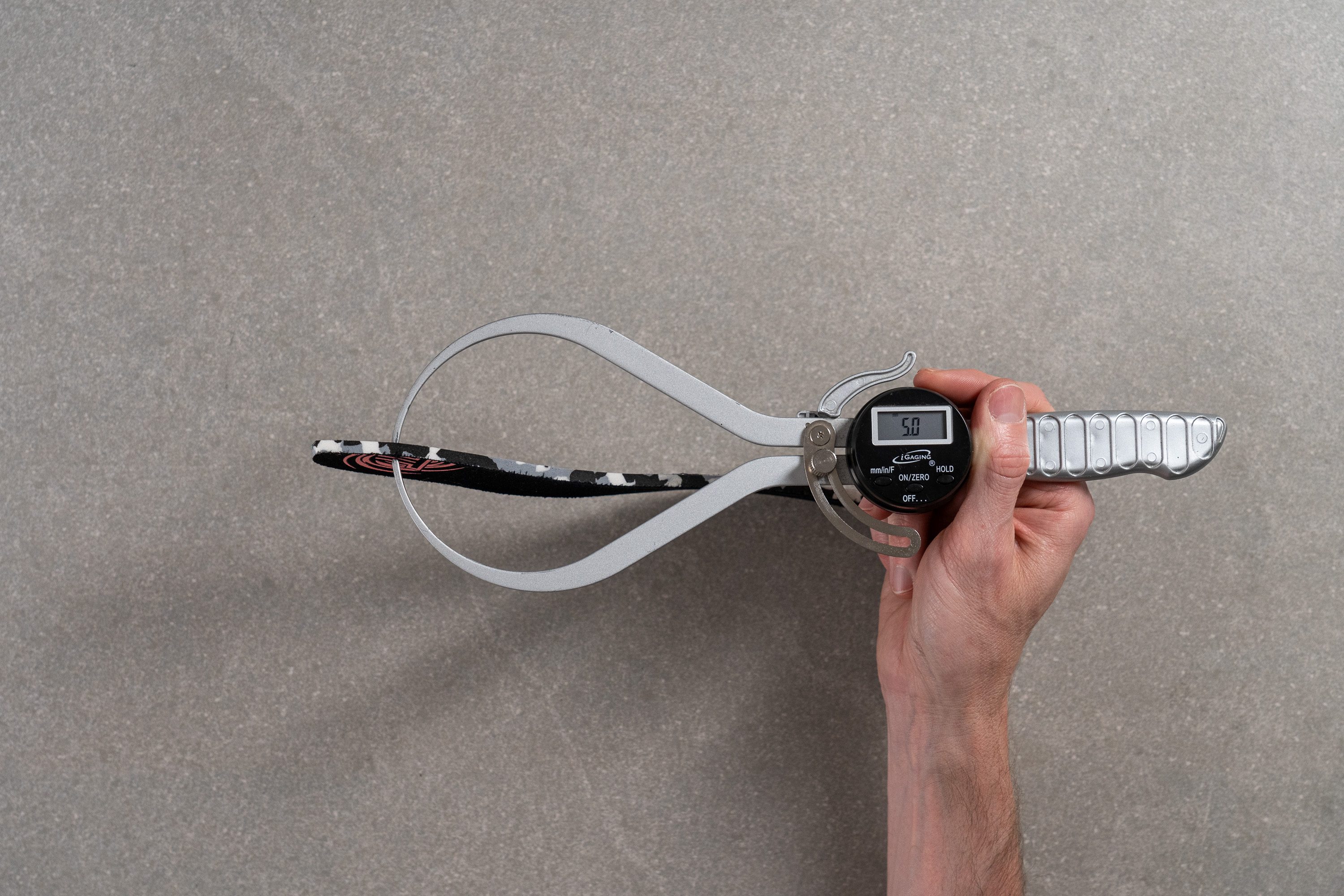
We loved this thick insole + Air Strobel combo, as it gave us some extra impact protection when we jumped for rebounds or when we performed aggressive layups.
| Tatum 2 | 5.0 mm |
| Average | 4.9 mm |
Removable insole
Removable insoles are something we'll never get tired of.
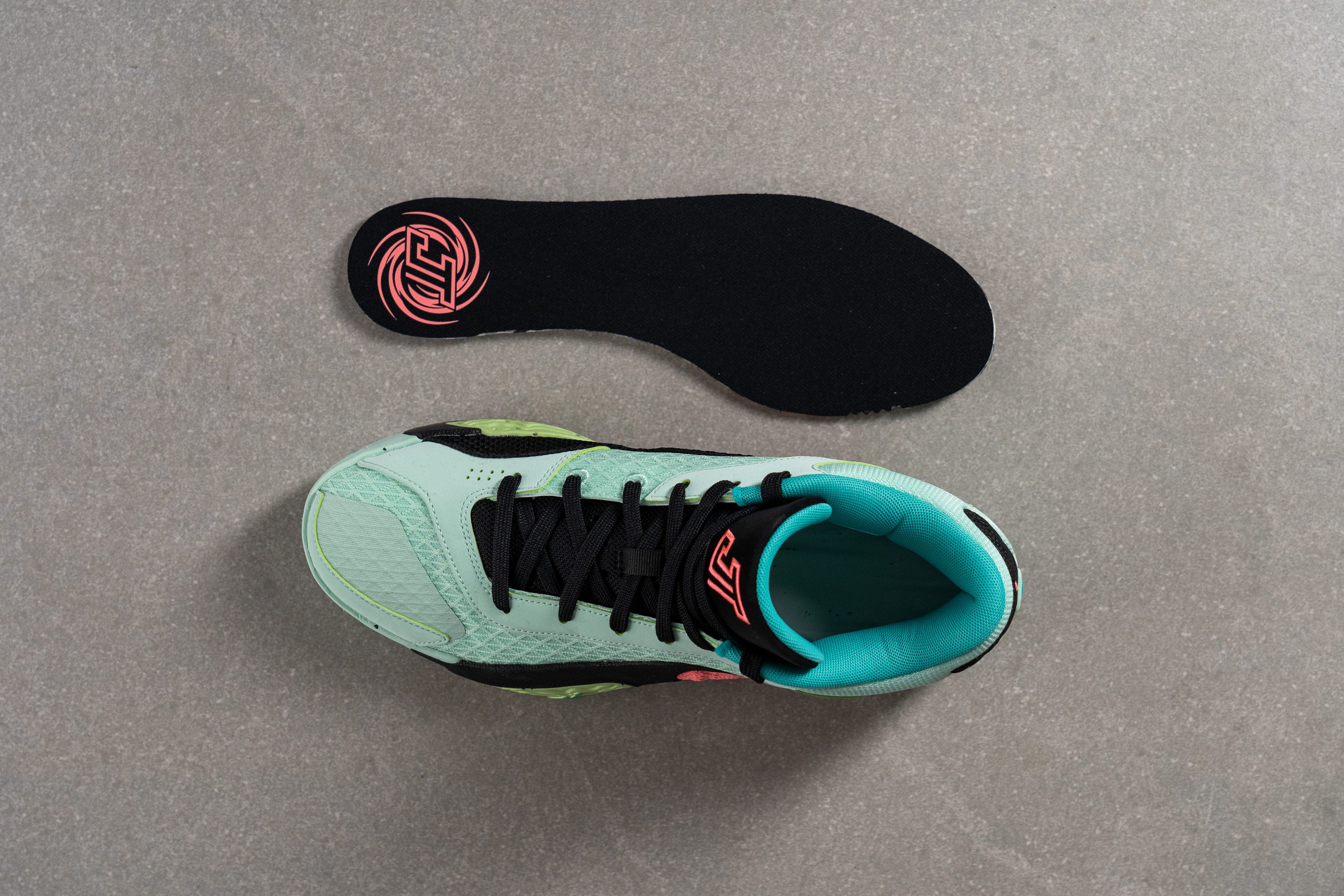
The JT logo looks awesome! But what's even more important is that you can use your own orthotics with this shoe, which is always great news!
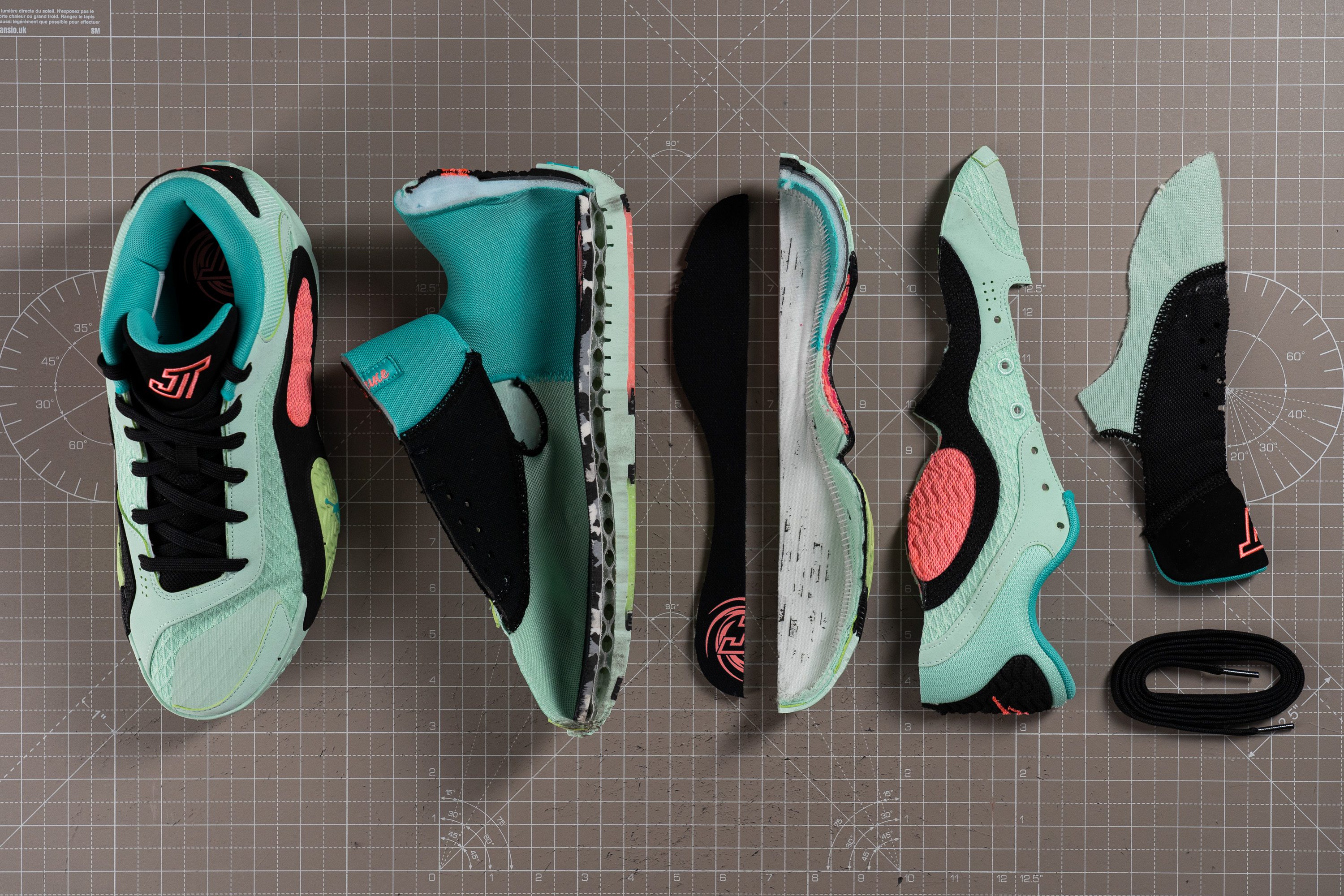
If you need some specific features, you can always change the insole. We were pretty happy with this shoe's default insole, but you can easily remove it if you want to use your own orthotics.
| Tatum 2 | Yes |
Reflective elements
Much like the Tatum 1, the Tatum 2 doesn't have any reflective elements.
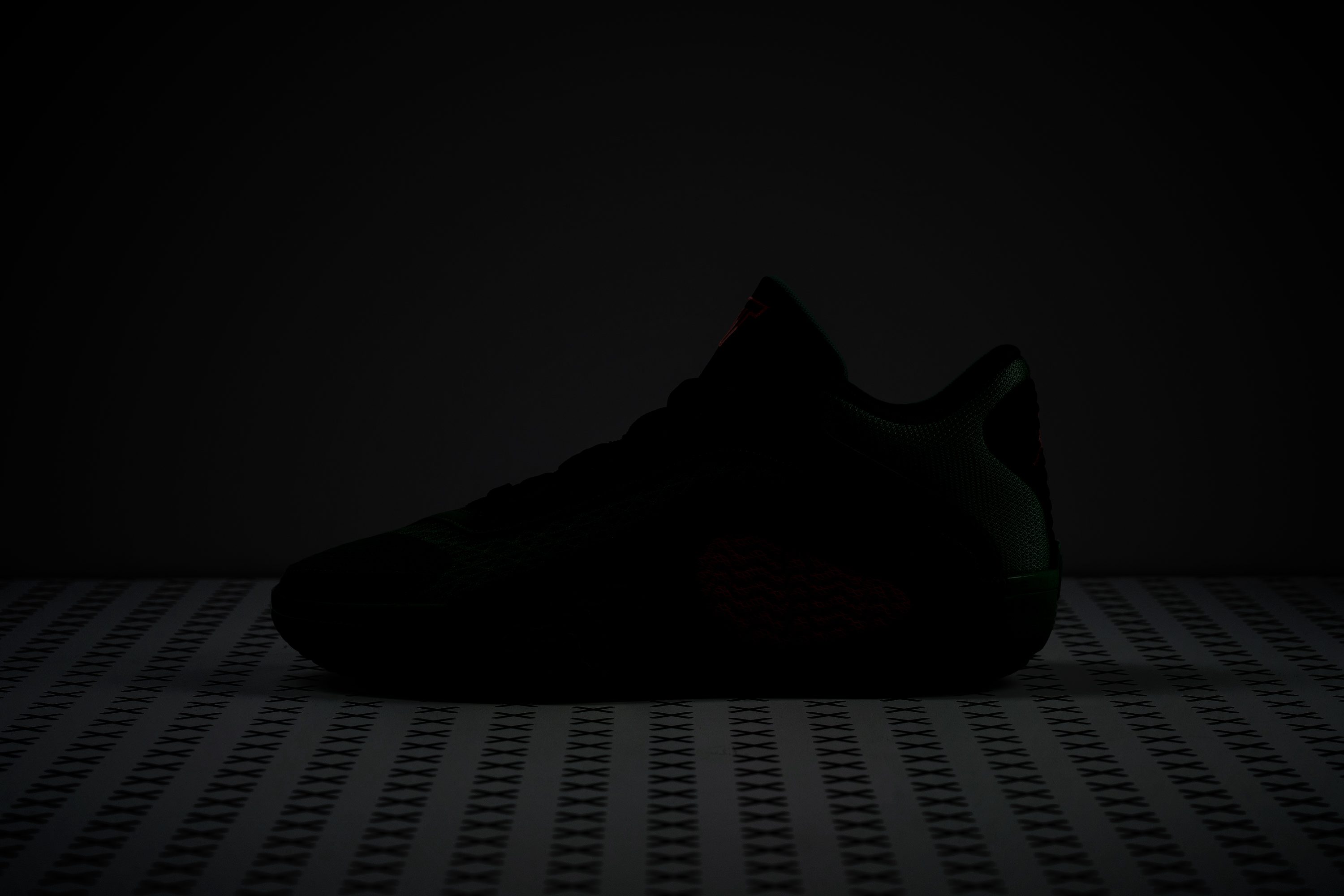
| Tatum 2 | No |
Tongue padding
The tongue padding is also different from the previous version. At 9.7 mm, it's thicker than average, and an incredibly 1.7 mm thicker than the v1's.
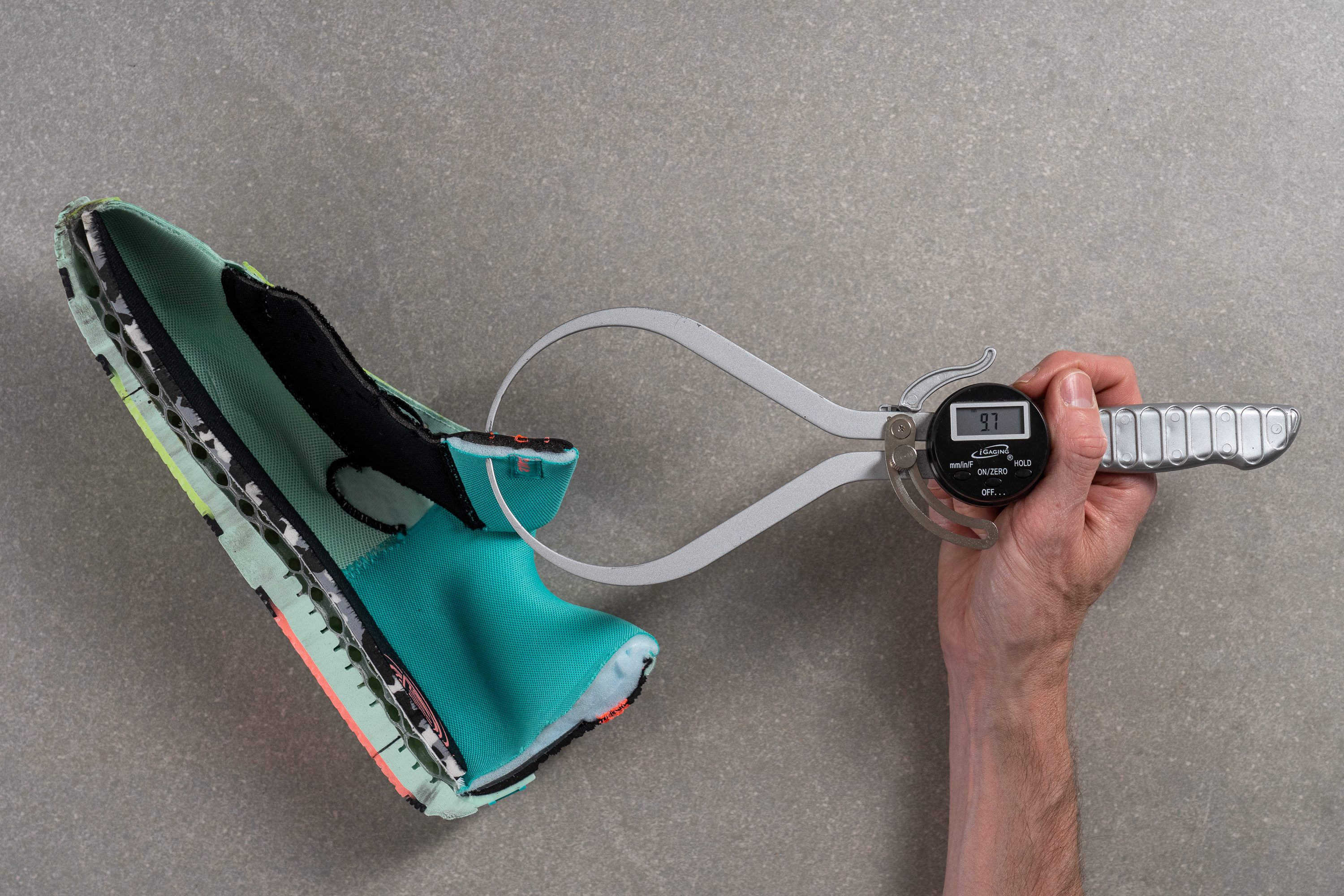
We didn't feel any kind of lace bite or uncomfortableness. The padded design of the tongue made us feel cosy and protected during our wear tests, as we could tie our shoes tighter without getting hurt from lace rubbing.
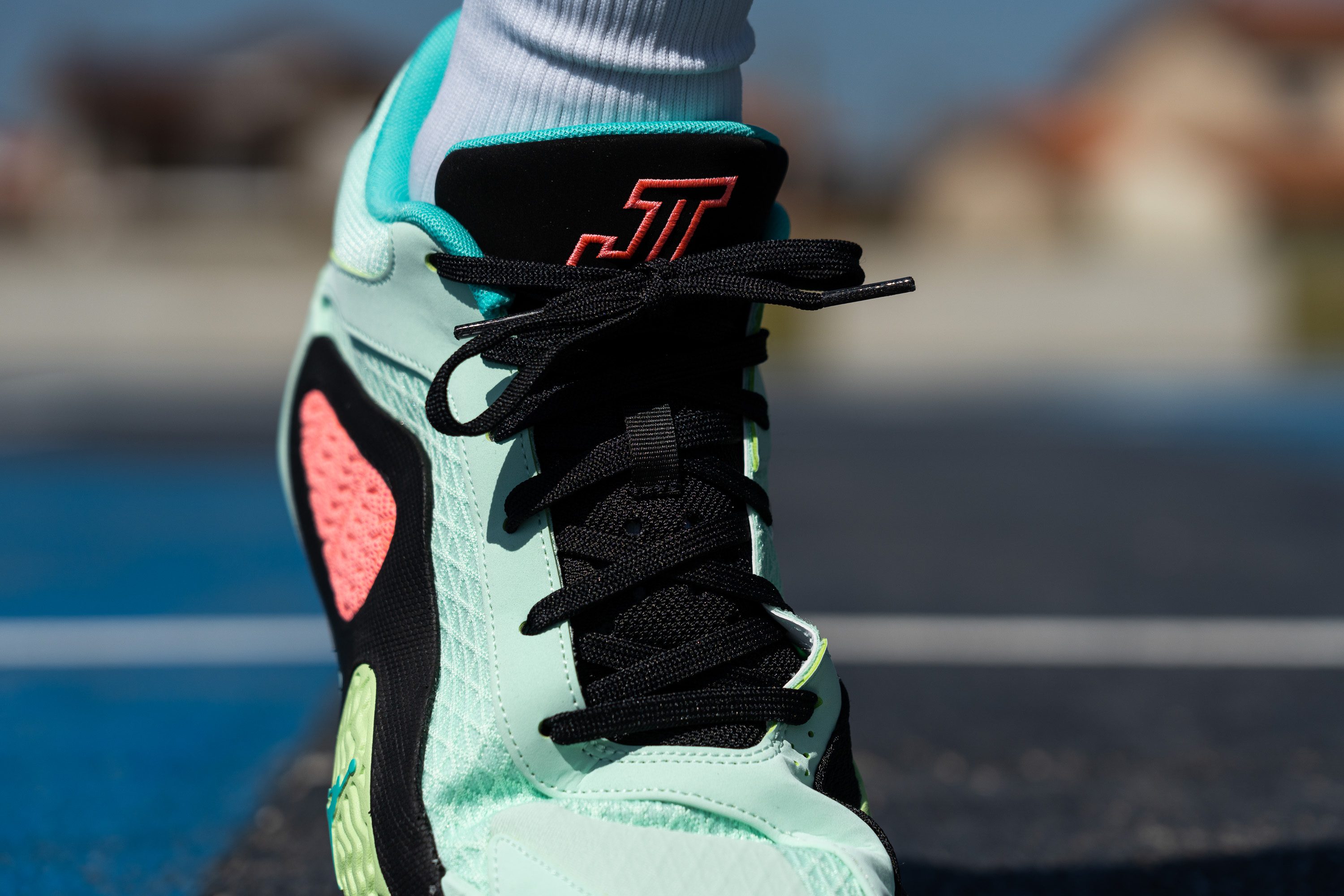
| Tatum 2 | 9.7 mm |
| Average | 9.3 mm |
Tongue: gusset type
We absolutely loved the Tatum 2's fully gusseted tongue.
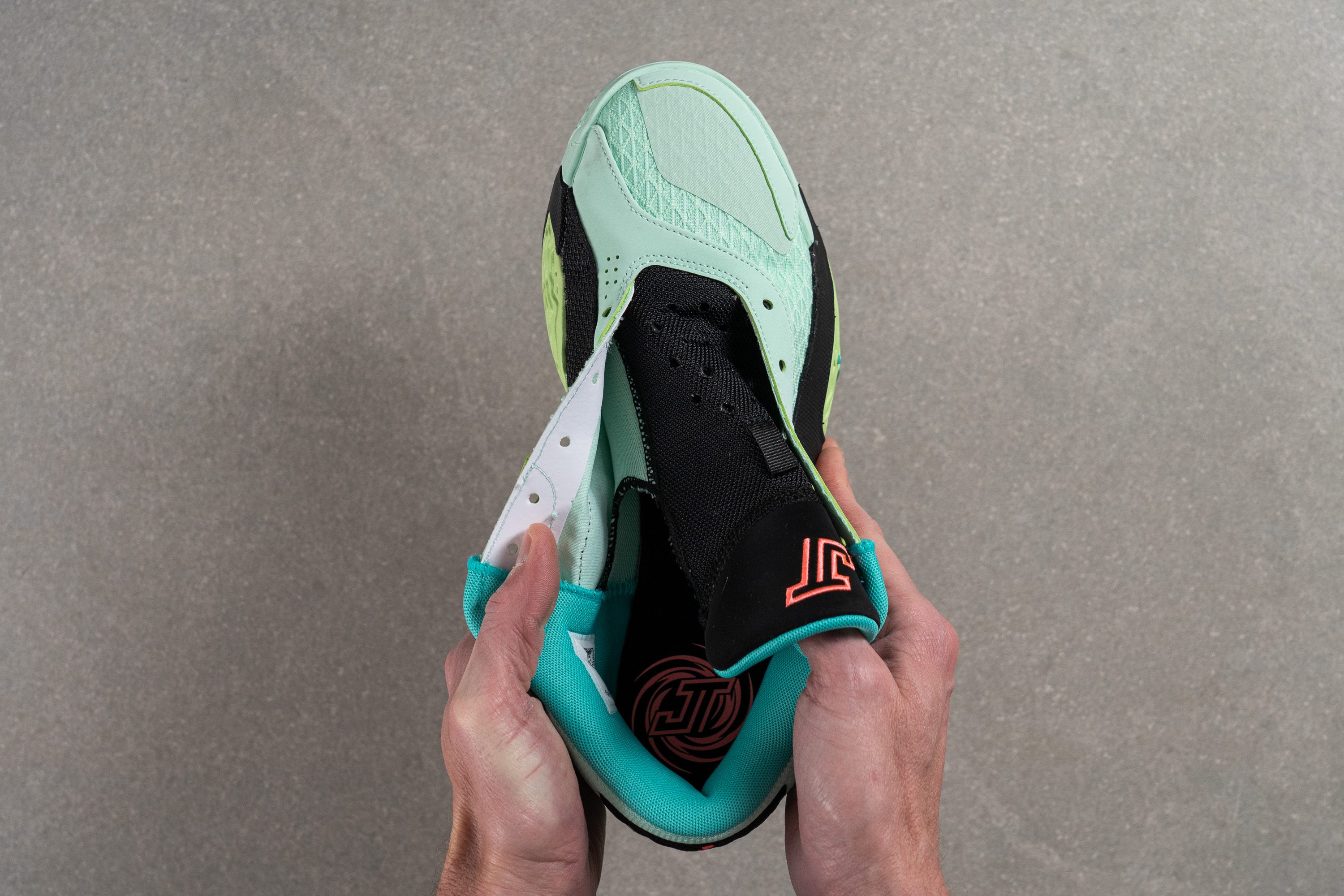
The lockdown feel and containment were great, and thanks to the lace in the middle of the tongue it didn't slip away. We really appreciated these two key points in our playtests, as they improved the supportive feel and we could go for more aggressive moves.
The cherry on top is the padded interior of this model, look!
There's a substantial amount of padding in the collar, which hugged our heels snuggly and comfortably. The top eyelet was the final touch, our ankles felt pretty happy with this fit!
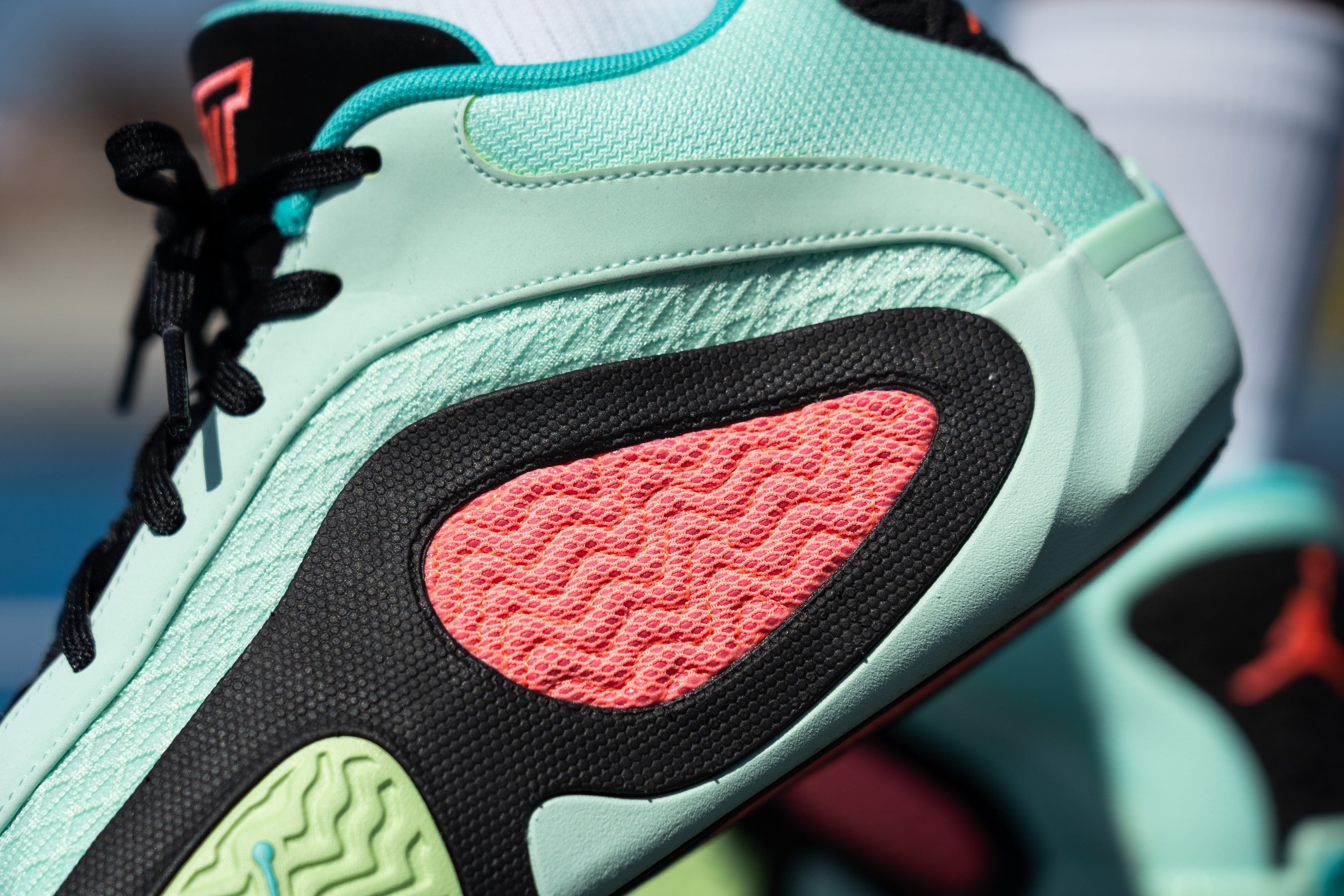
| Tatum 2 | Both sides (full) |
Heel tab
This shoe doesn't include any kind of heel tab. Honestly, its back design with the Jordan logo is so cool that a finger loop would not add extra points to its aesthetics.
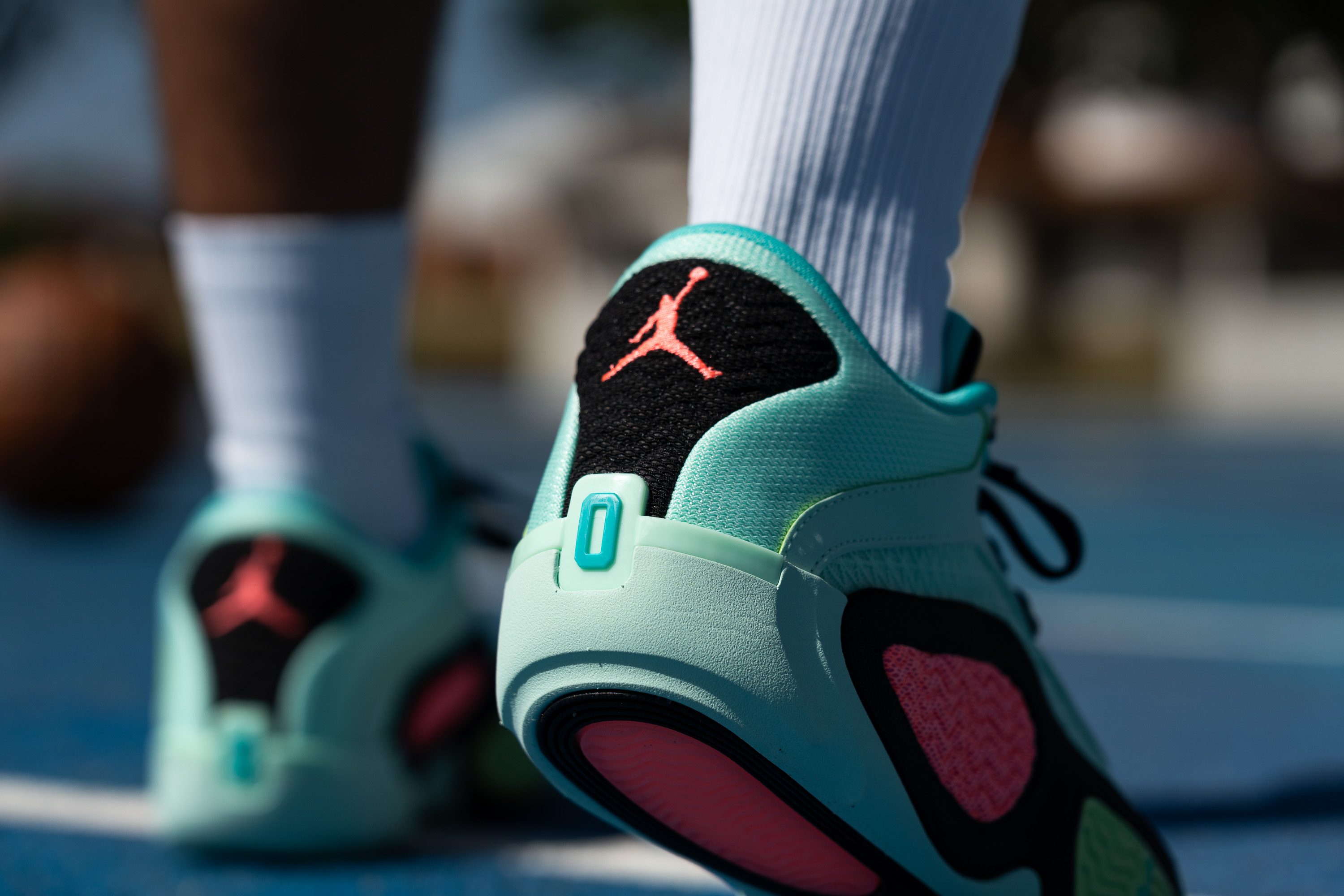
We loved the colour contrast on this one. The Jumpman looked sick in that black background. Talk about stylish!
| Tatum 2 | None |

